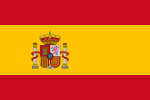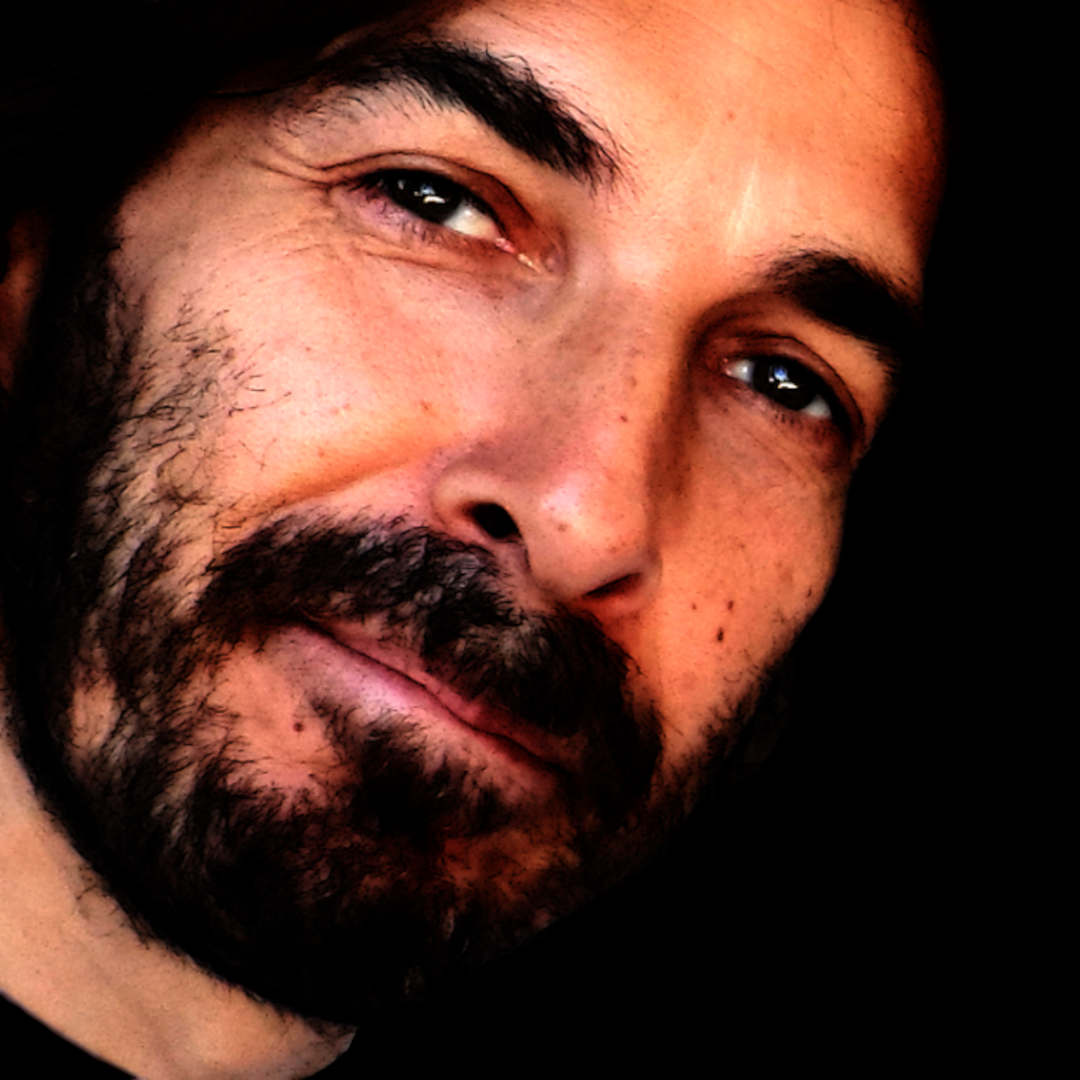Audio duration 41min - 4109 Greek wordsDuración del audio 41min - 4109 palabras griegas
 (Excerpt) Athena, the goddess with the gleaming eyes then answered to him: Father of us all, son of Cronos, supreme among the kings, if indeed this is now well pleasing to the blessed gods, that the wise Odysseus should return to his home, then let us send forth Hermes, the messenger, Slayer of Argus, to the isle Ogygia, that with all speed he may declare our unalterable decision to the fair-tressed Nymph, about the returning of the patient Odysseus, that he must come back home. But, as for me, I will go to Ithaca, that I may the more arouse his son and set courage in his heart, so that after he calls to an assembly the long-haired Achaeans, to speak out his word to all the suitors, who are ever slaying his flocks of sheep and his cattle with twisted horns. Then I will lead him to Sparta and to sandy Pylos to gain news on the return of his father, if he may hear of it somewhere, and to gain a worthy reputation among men».(Extracto) Atenea, la diosa de los ojos brillantes le contestó entonces a él: Padre de todos nosotros, hijo de Cronos, supremo entre los reyes, si esto ahora es bien agradable a los bienaventurados dioses, que el sabio Odiseo debería regresar a su casa, entonces enviemos a Hermes, al Mensajero Hermes, Matador de Argos, a la isla Ogigia, para que lo más pronto posible le diga nuestro firme decreto a la ninfa de la hermosa cabellera, sobre el regreso del paciente Odiseo, que debe volver a casa. Por mi lado, yo me iré a Ítaca, con el fin de animar más a su hijo e infundirle coraje en su corazon, para que, convocando a asamblea a los Aqueos de larga cabellera, contenga a los pretendientes todos, los cuales de continuo le degüellan incontables ovejas y sus vacas de cuernos retorcidos. Y le enviaré a Esparta y a la arenosa Pilos para que se informe del regreso de su padre, a ver si escucha algo de alguna parte, y para que obtenga noble fama entre las gentes».
(Excerpt) Athena, the goddess with the gleaming eyes then answered to him: Father of us all, son of Cronos, supreme among the kings, if indeed this is now well pleasing to the blessed gods, that the wise Odysseus should return to his home, then let us send forth Hermes, the messenger, Slayer of Argus, to the isle Ogygia, that with all speed he may declare our unalterable decision to the fair-tressed Nymph, about the returning of the patient Odysseus, that he must come back home. But, as for me, I will go to Ithaca, that I may the more arouse his son and set courage in his heart, so that after he calls to an assembly the long-haired Achaeans, to speak out his word to all the suitors, who are ever slaying his flocks of sheep and his cattle with twisted horns. Then I will lead him to Sparta and to sandy Pylos to gain news on the return of his father, if he may hear of it somewhere, and to gain a worthy reputation among men».(Extracto) Atenea, la diosa de los ojos brillantes le contestó entonces a él: Padre de todos nosotros, hijo de Cronos, supremo entre los reyes, si esto ahora es bien agradable a los bienaventurados dioses, que el sabio Odiseo debería regresar a su casa, entonces enviemos a Hermes, al Mensajero Hermes, Matador de Argos, a la isla Ogigia, para que lo más pronto posible le diga nuestro firme decreto a la ninfa de la hermosa cabellera, sobre el regreso del paciente Odiseo, que debe volver a casa. Por mi lado, yo me iré a Ítaca, con el fin de animar más a su hijo e infundirle coraje en su corazon, para que, convocando a asamblea a los Aqueos de larga cabellera, contenga a los pretendientes todos, los cuales de continuo le degüellan incontables ovejas y sus vacas de cuernos retorcidos. Y le enviaré a Esparta y a la arenosa Pilos para que se informe del regreso de su padre, a ver si escucha algo de alguna parte, y para que obtenga noble fama entre las gentes».Download MP3
Audio duration 3h,15min - 20010 Greek wordsDuración del audio 3h,15min - 20010 palabras griegas
 Our project «PATROLOGOS» is producing subtitled Greek audiobooks to be used by students of the Greek language as practice and learning material. We use selected texts from the enormous Greek cultural and spiritual heritage: The New Testament and the Septuagint Bible, the most important patristic works, the Homeric works and the masterpieces of classical theater and even the most modern Christian literature. Have fun and share. It᾽s all free. If you would like to contribute, please donate.Nuestro proyecto «PATROLOGOS» está produciendo audiolibros griegos subtitulados para ser utilizados por estudiantes de griego como material de práctica y aprendizaje. Utilizamos textos seleccionados del enorme patrimonio cultural y espiritual griego: El Nuevo Testamento y la Biblia Septuagista, las obras patrísticas más importantes, las obras homéricas y las obras maestras del teatro clásico e incluso la literatura cristiana más moderna. Diviértete y comparte. Es todo gratis. Si desea contribuir, por favor done.
Our project «PATROLOGOS» is producing subtitled Greek audiobooks to be used by students of the Greek language as practice and learning material. We use selected texts from the enormous Greek cultural and spiritual heritage: The New Testament and the Septuagint Bible, the most important patristic works, the Homeric works and the masterpieces of classical theater and even the most modern Christian literature. Have fun and share. It᾽s all free. If you would like to contribute, please donate.Nuestro proyecto «PATROLOGOS» está produciendo audiolibros griegos subtitulados para ser utilizados por estudiantes de griego como material de práctica y aprendizaje. Utilizamos textos seleccionados del enorme patrimonio cultural y espiritual griego: El Nuevo Testamento y la Biblia Septuagista, las obras patrísticas más importantes, las obras homéricas y las obras maestras del teatro clásico e incluso la literatura cristiana más moderna. Diviértete y comparte. Es todo gratis. Si desea contribuir, por favor done.Download MP3
Audio duration 1h,36min - 10422 Greek wordsDuración del audio 1h,36min - 10422 palabras griegas
 (Excerpt) The Revelation of Jesus Christ, which God gave Him to show His servants - things which must shortly take place. And He sent and signified it by His angel to His servant John, who bore witness to the word of God, and to the testimony of Jesus Christ, to all things that he saw.(Extracto) La revelación de Jesucristo, que Dios le dio para manifestar a sus siervos las cosas que deben suceder pronto. La declaró enviándola por medio de su ángel a su siervo Juan, el cual ha dado testimonio de la palabra de Dios, del testimonio de Jesucristo y de todas las cosas que ha visto.
(Excerpt) The Revelation of Jesus Christ, which God gave Him to show His servants - things which must shortly take place. And He sent and signified it by His angel to His servant John, who bore witness to the word of God, and to the testimony of Jesus Christ, to all things that he saw.(Extracto) La revelación de Jesucristo, que Dios le dio para manifestar a sus siervos las cosas que deben suceder pronto. La declaró enviándola por medio de su ángel a su siervo Juan, el cual ha dado testimonio de la palabra de Dios, del testimonio de Jesucristo y de todas las cosas que ha visto.Download MP3
Audio duration 4h,3min - 25113 Greek wordsDuración del audio 4h,3min - 25113 palabras griegas
 (Excerpt) Because we have terrible and cunning enemies, the evil demons; and our contending is against these, as the Apostle said; «Not against flesh and blood, but against the principalities and against the powers, against the world rulers of this present dark world, against the evil spirits, with the heavenly goods being the prize». Countless then is the crowd of the demons that exist in the air around us and they are not far from us and their variety is very large. And as far as their nature is concerned and their varieties, there could be a long discussion, but our purpose here now is to narrate other, greater things. For the present, what is pressing for us and it is necessary for us to know, it is the evil plans which they are plotting against us. And at first let us know this, that is, although the demons are called as such, they were not initially created like that because God did not create anything bad; so while they were created good, they fell from the heavenly wisdom, and they’ve been rolling ever since around the earth; and while they deceived the Greeks with their mythological fantasies, for us Christians, because they envy us, they move everything against us, in order to prevent our ascension to heaven, so that we do not ascend there from where they fell.(Extracto) Porque tenemos terribles y astutos enemigos, los malvados demonios; y contra éstos tenemos que luchar, como dijo el Apóstol; «No contra la carne ni la sangre, sino contra los principados y contra las potestades, contra los dominadores de este presente mundo tenebroso, a los malos espíritus, con los bienes celestiales siendo el premio». Innumerable entonces es la multitud de los demonios que existen en el aire que nos rodea y no están lejos de nosotros y su variedad es muy grande. Y en cuanto a su naturaleza se refiere y sus variedades, podría haber una larga discusión, pero nuestro propósito ahora aquí es narrar otras cosas, más grandes. Lo que nos apremia por ahora y es necesario que lo sepamos, son los planes malvados que traman contra nosotros. Y al principio conozcamos esto, es decir, aunque los demonios se llaman así, inicialmente no fueron creados así porque Dios no creó nada malo; así que mientras fueron creados buenos, cayeron de la sabiduría celeste, y desde entonces andan rodando alrededor de la tierra; y mientras a los griegos los engañaron con sus fantasías mitológicas, para nosotros cristianos, porque nos tienen envidia, lo mueven todo contra nosotros, con el fin de impedir nuestro ascenso a los cielos, para que no nos subamos allá de donde ellos cayeron.
(Excerpt) Because we have terrible and cunning enemies, the evil demons; and our contending is against these, as the Apostle said; «Not against flesh and blood, but against the principalities and against the powers, against the world rulers of this present dark world, against the evil spirits, with the heavenly goods being the prize». Countless then is the crowd of the demons that exist in the air around us and they are not far from us and their variety is very large. And as far as their nature is concerned and their varieties, there could be a long discussion, but our purpose here now is to narrate other, greater things. For the present, what is pressing for us and it is necessary for us to know, it is the evil plans which they are plotting against us. And at first let us know this, that is, although the demons are called as such, they were not initially created like that because God did not create anything bad; so while they were created good, they fell from the heavenly wisdom, and they’ve been rolling ever since around the earth; and while they deceived the Greeks with their mythological fantasies, for us Christians, because they envy us, they move everything against us, in order to prevent our ascension to heaven, so that we do not ascend there from where they fell.(Extracto) Porque tenemos terribles y astutos enemigos, los malvados demonios; y contra éstos tenemos que luchar, como dijo el Apóstol; «No contra la carne ni la sangre, sino contra los principados y contra las potestades, contra los dominadores de este presente mundo tenebroso, a los malos espíritus, con los bienes celestiales siendo el premio». Innumerable entonces es la multitud de los demonios que existen en el aire que nos rodea y no están lejos de nosotros y su variedad es muy grande. Y en cuanto a su naturaleza se refiere y sus variedades, podría haber una larga discusión, pero nuestro propósito ahora aquí es narrar otras cosas, más grandes. Lo que nos apremia por ahora y es necesario que lo sepamos, son los planes malvados que traman contra nosotros. Y al principio conozcamos esto, es decir, aunque los demonios se llaman así, inicialmente no fueron creados así porque Dios no creó nada malo; así que mientras fueron creados buenos, cayeron de la sabiduría celeste, y desde entonces andan rodando alrededor de la tierra; y mientras a los griegos los engañaron con sus fantasías mitológicas, para nosotros cristianos, porque nos tienen envidia, lo mueven todo contra nosotros, con el fin de impedir nuestro ascenso a los cielos, para que no nos subamos allá de donde ellos cayeron.Download MP3
Audio duration 1h,25min - 9577 Greek wordsDuración del audio 1h,25min - 9577 palabras griegas
 (Excerpt) My native land was Egypt. While my parents were still alive and I was twelve years old, I renounced my love towards them and I went to Alexandria; and I am ashamed even to think about it how in the beginning I corrupted my virginity and how I was drifted, uncontrollably and insatiably, to the passion of prostitution; but it would be more appropriate to recount all that now in brief, so that you may know the magnitude of my hedonistic passion. For more than seventeen years, forgive me Lord, I was a public temptation of promiscuity in the world, not so much, I am telling the truth, in order to gain money, because even when quite often some people wanted to give me money I wouldn’t accept them. I thought however, to offer free of charge what I myself desired, in order to attract more men into sleeping with me. And you should not think that I was not accepting the money because I had plenty, because I lived on alms or even many times by spinning canvas threads; but I had an insatiable desire and an irrepressible passion for lying in filth; and only this seemed to me that was the true living, the act of continuously practicing «the blasphemy against nature».(Extracto) Mi tierra natal era Egipto. Mientras mis padres aún vivían y yo tenía doce años, renuncié a mi amor hacia ellos y me fui a Alejandría; y me avergüenza hasta pensarlo como al principio corrompí mi virginidad y como me desvié, incontrolablemente e insaciablemente, a la pasión de la prostitución; pero sería más apropiado contar ahora todo eso en breve, para que sepas la magnitud de mi pasión hedonista. Durante más de diecisiete años, perdóname Señor, era una tentación pública de la promiscuidad en el mundo, no tanto, digo la verdad, para ganar dinero, porque incluso cuando muy a menudo algunas personas querían darme dinero yo no lo aceptaría. Pensé sin embargo, a ofrecer gratis lo que yo misma deseaba, para atraer más hombres a acostar conmigo. Y no deberias pensar que no estaba aceptando el dinero porque tenia de sobra, porque vivía de limosna o incluso muchas veces hilando hilos de lienzo; pero tenía un deseo insaciable y una pasión irreprimible por yacer en la inmundicia; y solo esto me parecia que era el verdadero vivir, el acto de practicar continuamente «la blasfemia contra la naturaleza».
(Excerpt) My native land was Egypt. While my parents were still alive and I was twelve years old, I renounced my love towards them and I went to Alexandria; and I am ashamed even to think about it how in the beginning I corrupted my virginity and how I was drifted, uncontrollably and insatiably, to the passion of prostitution; but it would be more appropriate to recount all that now in brief, so that you may know the magnitude of my hedonistic passion. For more than seventeen years, forgive me Lord, I was a public temptation of promiscuity in the world, not so much, I am telling the truth, in order to gain money, because even when quite often some people wanted to give me money I wouldn’t accept them. I thought however, to offer free of charge what I myself desired, in order to attract more men into sleeping with me. And you should not think that I was not accepting the money because I had plenty, because I lived on alms or even many times by spinning canvas threads; but I had an insatiable desire and an irrepressible passion for lying in filth; and only this seemed to me that was the true living, the act of continuously practicing «the blasphemy against nature».(Extracto) Mi tierra natal era Egipto. Mientras mis padres aún vivían y yo tenía doce años, renuncié a mi amor hacia ellos y me fui a Alejandría; y me avergüenza hasta pensarlo como al principio corrompí mi virginidad y como me desvié, incontrolablemente e insaciablemente, a la pasión de la prostitución; pero sería más apropiado contar ahora todo eso en breve, para que sepas la magnitud de mi pasión hedonista. Durante más de diecisiete años, perdóname Señor, era una tentación pública de la promiscuidad en el mundo, no tanto, digo la verdad, para ganar dinero, porque incluso cuando muy a menudo algunas personas querían darme dinero yo no lo aceptaría. Pensé sin embargo, a ofrecer gratis lo que yo misma deseaba, para atraer más hombres a acostar conmigo. Y no deberias pensar que no estaba aceptando el dinero porque tenia de sobra, porque vivía de limosna o incluso muchas veces hilando hilos de lienzo; pero tenía un deseo insaciable y una pasión irreprimible por yacer en la inmundicia; y solo esto me parecia que era el verdadero vivir, el acto de practicar continuamente «la blasfemia contra la naturaleza».Download MP3
Audio duration 40min - 4220 Greek wordsDuración del audio 40min - 4220 palabras griegas
 (Excerpt) In this feast for the birthday of the child, some fifty-five chosen men came to the king, of those who occupied themselves with the astrology of the Chaldeans. After the king invited them to seat near him, he was asking each one of them to tell him what would become his child that was born. Them then, after they had consulted each other for a long time, they said that he would become great both in riches and in power and he would surpass all who had reigned before him. But one of the astrologers, who was completely different from all the others that were with him, said; «From what the courses of the stars teach me my king, the advancement of the child that has just been born to you, will not be in your kingdom, but in another superior one and greater beyond compare. I also think that he will embrace the religion of the Christians, which you persecute, and I don’t believe that he will be disappointed in his aim and in his hope». In this way the astrologer spoke, like Balaam of the old days, without this meaning that the astrology were telling the truth, but only that God signified the truth by the mouth of his opponents in order to remove every excuse from the ungodly. When the king heard these things, he received the tidings with a very heavy heart, and the sorrow that took him over cut his joy short. After he built a very beautiful palace in a city set apart and he decorated gorgeous chambers, he set his son to live there, after the completion of his first infancy, and he forbade anyone to approach him.(Extracto) En esta fiesta para el nacimiento del niño, unos cincuenta y cinco hombres elegidos vinieron al rey, de los que se ocupaban con la astrología de los Caldeos. Después de que el rey los invitó a sentarse cerca de él, estaba preguntando a cada uno de ellos a decirle en que se convertiría su hijo recién nacido. Ellos entonces, después de haber consultado entre sí durante mucho tiempo, dijeron que se volvería grande tanto en riquezas como en poder y los superaría a todos que habían reinado antes que él. Pero uno de los astrólogos, que era completamente diferente de todos los demás que estaban con él, dijo; «De lo que los cursos de las estrellas me enseñan mi rey, el avance del niño que te acaba de nacer, no estará en tu reino, sino en otro superior y más grande sin comparación. También pienso que él abrazará la religión de los Cristianos, que tu persigues, y no creo que se va a desilusionar en su objetivo y en su esperanza». De esta manera habló el astrólogo, como Balaam de antaño, sin que esto signifique que la astrología estaba diciendo la verdad, sino que Dios manifestó la verdad por la boca de sus adversarios para eliminar toda excusa de los impíos. Cuando el rey escuchó estas cosas, recibió las noticias con muy pesado corazón, y la pena que se apoderó de él truncó su alegría. Después de que construyó un palacio muy hermoso en una ciudad apartada y decoró magníficas cámaras, puso a su hijo a vivir allí, después del cumplimiento de su primera infancia, y prohibió que cualquiera se acercara a él.
(Excerpt) In this feast for the birthday of the child, some fifty-five chosen men came to the king, of those who occupied themselves with the astrology of the Chaldeans. After the king invited them to seat near him, he was asking each one of them to tell him what would become his child that was born. Them then, after they had consulted each other for a long time, they said that he would become great both in riches and in power and he would surpass all who had reigned before him. But one of the astrologers, who was completely different from all the others that were with him, said; «From what the courses of the stars teach me my king, the advancement of the child that has just been born to you, will not be in your kingdom, but in another superior one and greater beyond compare. I also think that he will embrace the religion of the Christians, which you persecute, and I don’t believe that he will be disappointed in his aim and in his hope». In this way the astrologer spoke, like Balaam of the old days, without this meaning that the astrology were telling the truth, but only that God signified the truth by the mouth of his opponents in order to remove every excuse from the ungodly. When the king heard these things, he received the tidings with a very heavy heart, and the sorrow that took him over cut his joy short. After he built a very beautiful palace in a city set apart and he decorated gorgeous chambers, he set his son to live there, after the completion of his first infancy, and he forbade anyone to approach him.(Extracto) En esta fiesta para el nacimiento del niño, unos cincuenta y cinco hombres elegidos vinieron al rey, de los que se ocupaban con la astrología de los Caldeos. Después de que el rey los invitó a sentarse cerca de él, estaba preguntando a cada uno de ellos a decirle en que se convertiría su hijo recién nacido. Ellos entonces, después de haber consultado entre sí durante mucho tiempo, dijeron que se volvería grande tanto en riquezas como en poder y los superaría a todos que habían reinado antes que él. Pero uno de los astrólogos, que era completamente diferente de todos los demás que estaban con él, dijo; «De lo que los cursos de las estrellas me enseñan mi rey, el avance del niño que te acaba de nacer, no estará en tu reino, sino en otro superior y más grande sin comparación. También pienso que él abrazará la religión de los Cristianos, que tu persigues, y no creo que se va a desilusionar en su objetivo y en su esperanza». De esta manera habló el astrólogo, como Balaam de antaño, sin que esto signifique que la astrología estaba diciendo la verdad, sino que Dios manifestó la verdad por la boca de sus adversarios para eliminar toda excusa de los impíos. Cuando el rey escuchó estas cosas, recibió las noticias con muy pesado corazón, y la pena que se apoderó de él truncó su alegría. Después de que construyó un palacio muy hermoso en una ciudad apartada y decoró magníficas cámaras, puso a su hijo a vivir allí, después del cumplimiento de su primera infancia, y prohibió que cualquiera se acercara a él.Download MP3
Audio duration 1h,40min - 10541 Greek wordsDuración del audio 1h,40min - 10541 palabras griegas
 (Excerpt) Bring up your child as an athlete for Christ. I am not saying this, to obstruct him from entering into marriage and to send him to the desert and to prepare him to prefer the solitary life; I’m not saying this. I want this of course and I would wish if everyone would accept it, but because it is considered to be heavy, I do not force. Bring up your child as an athlete for Christ and while living within the world teach him since his early youth how to be pious. If the good teachings are imprinted in the soul while it is still soft, nobody will be able to eliminate them, when it will become hard like the sealing wax, exactly as it happens also with the wax.(Extracto) Cría a tu hijo como un atleta para Cristo. No digo esto, obstruirle de contraer matrimonio y enviarle al desierto y prepararle preferir la vida solitaria; no digo esto. Lo quiero esto por supuesto y me gustaría si todos lo aceptaran, pero como se considera ser pesado, no lo fuerzo. Cría a tu hijo como un atleta para Cristo y mientras viva dentro del mundo enseñale desde su temprana juventud cómo ser piadoso. Si las buenas enseñanzas están impresas en el alma mientras aún está suave, nadie va a poder eliminarlas, cuando ella se pondrá dura como la lacre, exactamente como sucede con la cera también.
(Excerpt) Bring up your child as an athlete for Christ. I am not saying this, to obstruct him from entering into marriage and to send him to the desert and to prepare him to prefer the solitary life; I’m not saying this. I want this of course and I would wish if everyone would accept it, but because it is considered to be heavy, I do not force. Bring up your child as an athlete for Christ and while living within the world teach him since his early youth how to be pious. If the good teachings are imprinted in the soul while it is still soft, nobody will be able to eliminate them, when it will become hard like the sealing wax, exactly as it happens also with the wax.(Extracto) Cría a tu hijo como un atleta para Cristo. No digo esto, obstruirle de contraer matrimonio y enviarle al desierto y prepararle preferir la vida solitaria; no digo esto. Lo quiero esto por supuesto y me gustaría si todos lo aceptaran, pero como se considera ser pesado, no lo fuerzo. Cría a tu hijo como un atleta para Cristo y mientras viva dentro del mundo enseñale desde su temprana juventud cómo ser piadoso. Si las buenas enseñanzas están impresas en el alma mientras aún está suave, nadie va a poder eliminarlas, cuando ella se pondrá dura como la lacre, exactamente como sucede con la cera también.Download MP3
Audio duration 1h,6min - 6490 Greek wordsDuración del audio 1h,6min - 6490 palabras griegas
 (Excerpt) There exist no such place from where God is absent. We also should, we, the pious Christians, when we want to do some sin, we should consider that God is right within our hearts, that he is present everywhere, and that He sees us; we should be ashamed before the Angels, before the Saints, and especially before the angel, the guardian of our soul, the one who is watching us. Before a little child we are embarrassed, when we commit the sin, and how can we not being embarrassed before so many Saints and Angels?(Extracto) No existe tal lugar de donde Dios está ausente. Deberíamos también, nosotros cristianos piadosos, cuando queramos hacer algún pecado, deberíamos considerar que Dios está dentro de nuestros corazones, que está presente en todas partes, y Él nos está viendo; deberíamos avergonzarnos ante los Ángeles, ante los Santos, y especialmente ante el ángel, el guardián de nuestra alma, él que nos esta vigilando. Ante un niño pequeño nos avergonzamos, cuando cometemos el pecado, y ¿como no vamos a estar avergonzados ante tantos Santos y Ángeles?
(Excerpt) There exist no such place from where God is absent. We also should, we, the pious Christians, when we want to do some sin, we should consider that God is right within our hearts, that he is present everywhere, and that He sees us; we should be ashamed before the Angels, before the Saints, and especially before the angel, the guardian of our soul, the one who is watching us. Before a little child we are embarrassed, when we commit the sin, and how can we not being embarrassed before so many Saints and Angels?(Extracto) No existe tal lugar de donde Dios está ausente. Deberíamos también, nosotros cristianos piadosos, cuando queramos hacer algún pecado, deberíamos considerar que Dios está dentro de nuestros corazones, que está presente en todas partes, y Él nos está viendo; deberíamos avergonzarnos ante los Ángeles, ante los Santos, y especialmente ante el ángel, el guardián de nuestra alma, él que nos esta vigilando. Ante un niño pequeño nos avergonzamos, cuando cometemos el pecado, y ¿como no vamos a estar avergonzados ante tantos Santos y Ángeles?Download MP3
Audio duration 32min - 3574 Greek wordsDuración del audio 32min - 3574 palabras griegas
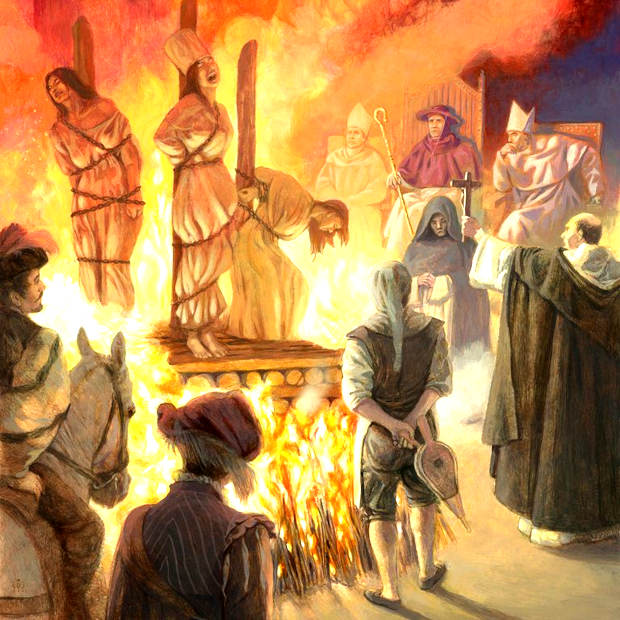 (Excerpt) Many, countless, are the things been written about papism, but they are few like those written about this enigmatic system by the most profound and apocalyptical Russian writer Fyodor Dostoevsky. This remarkable text is a chapter from within his book «The Brothers Karamazov», and this chapter has the heading of «The Great Inquisitor». Dostoevsky, despite him being a philosophical spirit, nevertheless in the «Great Inquisitor» he feels and he writes like an Orthodox Christian, who knows well who the real Christ is and His teaching. In the «Great Inquisitor» he places Christ to be facing His fake representative on earth, the Jesuit Inquisitor, the dreadful monster that burned the «heretics» in the name of Christ, an incredible thing and incomprehensible. It is terrible if someone considers what the devil can come to do in order to slander Christ, since he even reaches to the point for satan to appear that he is Christ himself! In this paradoxical text by Dostoevsky, the Inquisitor is making a long confession to Christ, who does not utter not even a word from his mouth in order to give an answer to the questions of the Inquisitor, and for this reason he responds on his own to all that he asks. In other words, all that he says is a depressing monologue that comes out of the mouth of some creature that you think it climbed from hell.(Extracto) Muchos, innumerables, son las cosas que se han escrito sobre el papismo, pero pocos son como estos que escribió sobre este sistema enigmático el mas profundo y apocalíptico escritor Ruso Fiódor Dostoievski. Este texto extraordinario es un capítulo dentro de su libro «Los hermanos Karamazov», y este capítulo tiene el título de «El Gran Inquisidor». Dostoievski, a pesar de que él es un espíritu filosófico, sin embargo en el «Gran Inquisidor» siente y escribe como un Cristiano Ortodoxo, que sabe bien quien es el verdadero Cristo y Su enseñanza. En el «Gran Inquisidor» él coloca a Cristo frente a Su falso representante en la tierra, el Jesuita Inquisidor, el monstruo terrible que quemaba los «hereticos» en el nombre de Cristo, una cosa increíble e incomprensible. Es terrible si alguien considera que el diablo puede llegar a hacer para difamar a Cristo, ya que incluso llega al punto de que el satanás aparezca que es el mismo Cristo! En este texto paradójico por Dostoievski, el Inquisidor está haciendo una larga confesión a Cristo, que no pronuncia ni siquiera una palabra de su boca para dar una respuesta a las preguntas del inquisidor, y por esta razon se responde el mismo a todo lo que pregunta. En otras palabras, todo lo que dice es un monólogo deprimente que sale de la boca de una criatura que crees que subió del infierno.
(Excerpt) Many, countless, are the things been written about papism, but they are few like those written about this enigmatic system by the most profound and apocalyptical Russian writer Fyodor Dostoevsky. This remarkable text is a chapter from within his book «The Brothers Karamazov», and this chapter has the heading of «The Great Inquisitor». Dostoevsky, despite him being a philosophical spirit, nevertheless in the «Great Inquisitor» he feels and he writes like an Orthodox Christian, who knows well who the real Christ is and His teaching. In the «Great Inquisitor» he places Christ to be facing His fake representative on earth, the Jesuit Inquisitor, the dreadful monster that burned the «heretics» in the name of Christ, an incredible thing and incomprehensible. It is terrible if someone considers what the devil can come to do in order to slander Christ, since he even reaches to the point for satan to appear that he is Christ himself! In this paradoxical text by Dostoevsky, the Inquisitor is making a long confession to Christ, who does not utter not even a word from his mouth in order to give an answer to the questions of the Inquisitor, and for this reason he responds on his own to all that he asks. In other words, all that he says is a depressing monologue that comes out of the mouth of some creature that you think it climbed from hell.(Extracto) Muchos, innumerables, son las cosas que se han escrito sobre el papismo, pero pocos son como estos que escribió sobre este sistema enigmático el mas profundo y apocalíptico escritor Ruso Fiódor Dostoievski. Este texto extraordinario es un capítulo dentro de su libro «Los hermanos Karamazov», y este capítulo tiene el título de «El Gran Inquisidor». Dostoievski, a pesar de que él es un espíritu filosófico, sin embargo en el «Gran Inquisidor» siente y escribe como un Cristiano Ortodoxo, que sabe bien quien es el verdadero Cristo y Su enseñanza. En el «Gran Inquisidor» él coloca a Cristo frente a Su falso representante en la tierra, el Jesuita Inquisidor, el monstruo terrible que quemaba los «hereticos» en el nombre de Cristo, una cosa increíble e incomprensible. Es terrible si alguien considera que el diablo puede llegar a hacer para difamar a Cristo, ya que incluso llega al punto de que el satanás aparezca que es el mismo Cristo! En este texto paradójico por Dostoievski, el Inquisidor está haciendo una larga confesión a Cristo, que no pronuncia ni siquiera una palabra de su boca para dar una respuesta a las preguntas del inquisidor, y por esta razon se responde el mismo a todo lo que pregunta. En otras palabras, todo lo que dice es un monólogo deprimente que sale de la boca de una criatura que crees que subió del infierno.Download MP3
Audio duration 16min - 1693 Greek wordsDuración del audio 16min - 1693 palabras griegas
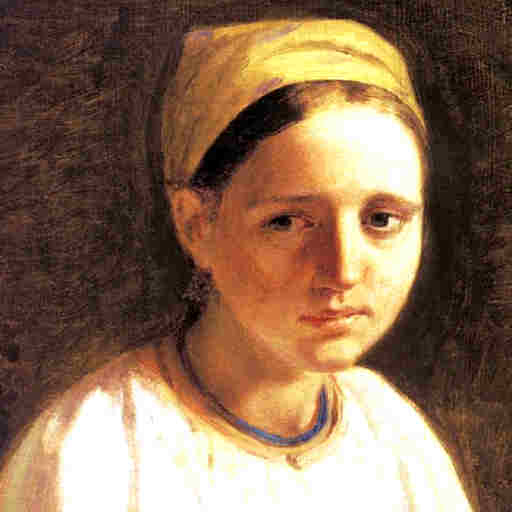 (Excerpt) In the villages nothing changes, except if it occurs an earthquake or a cataclysm. Nevertheless, all of a sudden, without warning, something unbelievable happened in the life of Lelouda. She is making a new dress! They saw one day her older sister, the madam Katigko, sitting on the loom. She was very serious the moment she began to prepare it. Then came near her little granddaughter and asked her: -Madam, is aunt Lelouda going to die? -Who told you that, girl? - So they say, when an old woman prepares her new dress. - You do not mess with these things! Your aunt Lelouda is alive, girl, don’t you see her coming?(Extracto) En los pueblos no cambia nada, excepto si ocurre un terremoto o un cataclismo. Sin embargo, de repente, sin previo aviso, algo increíble sucedió en la vida de Lelouda. ¡Ella está haciendo un nuevo vestido! Vieron un día su hermana mayor, la señora Katigko, sentada en el telar. Estaba muy seria el momento que empezó a prepararlo. Entonces se acercó su nieta pequeña y le pregunto: -Señora, ¿se va a morir la tía Lelouda? -¿Quién te dijo eso, niña? - Así dicen, cuando una anciana prepara su nuevo vestido. - ¡Tu no te metas con estas cosas! Tu tía Lelouda está viva, niña, ¿no la ves venir?
(Excerpt) In the villages nothing changes, except if it occurs an earthquake or a cataclysm. Nevertheless, all of a sudden, without warning, something unbelievable happened in the life of Lelouda. She is making a new dress! They saw one day her older sister, the madam Katigko, sitting on the loom. She was very serious the moment she began to prepare it. Then came near her little granddaughter and asked her: -Madam, is aunt Lelouda going to die? -Who told you that, girl? - So they say, when an old woman prepares her new dress. - You do not mess with these things! Your aunt Lelouda is alive, girl, don’t you see her coming?(Extracto) En los pueblos no cambia nada, excepto si ocurre un terremoto o un cataclismo. Sin embargo, de repente, sin previo aviso, algo increíble sucedió en la vida de Lelouda. ¡Ella está haciendo un nuevo vestido! Vieron un día su hermana mayor, la señora Katigko, sentada en el telar. Estaba muy seria el momento que empezó a prepararlo. Entonces se acercó su nieta pequeña y le pregunto: -Señora, ¿se va a morir la tía Lelouda? -¿Quién te dijo eso, niña? - Así dicen, cuando una anciana prepara su nuevo vestido. - ¡Tu no te metas con estas cosas! Tu tía Lelouda está viva, niña, ¿no la ves venir?Download MP3
Audio duration 21min - 2309 Greek wordsDuración del audio 21min - 2309 palabras griegas
 (Excerpt) But suddenly the bell of the train rang. And they decided the separation among them. The respectful woman hesitated, whether she should acknowledge this moment, whether she should give herself up to it. She stood for a little while, as if she wanted to resist. Then she threw herself to the youngest of the girls kissing her on the waves of her hair, on her neck and on her eyes, in real despair. The two men renounced immediately the pride posture of their gender. Their knees started shaking, the handkerchief found its way to their eyes. After the youngest girl, the woman embraced in her arms the oldest one, then the one man and the other. And again she started kissing the youngest. And out of fear that she might not have the time to leave her mark to everyone forever - cause it seems she would travel so far away, so that she would not have another encounter anymore in this life with them -, she would touch now the neck of one of them, then the hair and the forehead of another and she would try with the touch of her hand to keep as if with a photograph the feeling that gives the skin of her beloved persons. Thumps of chests, yelling of bearers, creaks of wagons, outcries of people all of them fell upon this sacred moment with the insistence that the crude and the tangible ones have to keep crushing every weakness of ours, that dares to present itself at such times.(Extracto) Pero de repente sonó la campana del tren. Y entonces se decidió entre ellos la separación. La respetuosa mujer dudó, si debería reconocer ese momento, si debería entregarse a ello. Se quedó un poco, como si quisiera resistir. Luego se abalanzó a la mas joven de las chicas y le daba besos en las ondas de du pelo, en el cuello y en los ojos, con verdadera desesperación. Los dos hombres renunciaron immediatamente la postura orgullosa de su genero. Sus rodillas temblaron, el pañuelo se encontró a sus ojos. Despues de la chica más joven, la mujer apretó en sus brazos a la mayor, luego a un hombre y al otro. Y otra vez empezó a dar besos a la pequeña. Y del miedo de que no iba a llegar a dejar con todos su rastro para siempre - porque parece que partiría para tan lejos, que otro encuentro ya no tendría en esta vida con ellos -, estaba palpando ahora el cuello de uno de elllos, ahora el pelo y la frente del otro y trataba con el tacto de su mano de guardar como un fotografia la sensación que daba la piel de su gente querida. Golpes de baules, gritos de los maleteros, el crujido de los vagones, el clamor de la gente todos cayéron por encima de ese momento sagrado con la persistencia que las cosas gordas y tangibles tienen para desbaratar cada debilidad nuestra, que se atreve a aparecer en tales horas.
(Excerpt) But suddenly the bell of the train rang. And they decided the separation among them. The respectful woman hesitated, whether she should acknowledge this moment, whether she should give herself up to it. She stood for a little while, as if she wanted to resist. Then she threw herself to the youngest of the girls kissing her on the waves of her hair, on her neck and on her eyes, in real despair. The two men renounced immediately the pride posture of their gender. Their knees started shaking, the handkerchief found its way to their eyes. After the youngest girl, the woman embraced in her arms the oldest one, then the one man and the other. And again she started kissing the youngest. And out of fear that she might not have the time to leave her mark to everyone forever - cause it seems she would travel so far away, so that she would not have another encounter anymore in this life with them -, she would touch now the neck of one of them, then the hair and the forehead of another and she would try with the touch of her hand to keep as if with a photograph the feeling that gives the skin of her beloved persons. Thumps of chests, yelling of bearers, creaks of wagons, outcries of people all of them fell upon this sacred moment with the insistence that the crude and the tangible ones have to keep crushing every weakness of ours, that dares to present itself at such times.(Extracto) Pero de repente sonó la campana del tren. Y entonces se decidió entre ellos la separación. La respetuosa mujer dudó, si debería reconocer ese momento, si debería entregarse a ello. Se quedó un poco, como si quisiera resistir. Luego se abalanzó a la mas joven de las chicas y le daba besos en las ondas de du pelo, en el cuello y en los ojos, con verdadera desesperación. Los dos hombres renunciaron immediatamente la postura orgullosa de su genero. Sus rodillas temblaron, el pañuelo se encontró a sus ojos. Despues de la chica más joven, la mujer apretó en sus brazos a la mayor, luego a un hombre y al otro. Y otra vez empezó a dar besos a la pequeña. Y del miedo de que no iba a llegar a dejar con todos su rastro para siempre - porque parece que partiría para tan lejos, que otro encuentro ya no tendría en esta vida con ellos -, estaba palpando ahora el cuello de uno de elllos, ahora el pelo y la frente del otro y trataba con el tacto de su mano de guardar como un fotografia la sensación que daba la piel de su gente querida. Golpes de baules, gritos de los maleteros, el crujido de los vagones, el clamor de la gente todos cayéron por encima de ese momento sagrado con la persistencia que las cosas gordas y tangibles tienen para desbaratar cada debilidad nuestra, que se atreve a aparecer en tales horas.Download MP3
Audio duration 21min - 2272 Greek wordsDuración del audio 21min - 2272 palabras griegas
 (Excerpt) «I don’t know this art, master», he said to him; «and its the first time that I see from so close someone to paint. But it’s a wonderful art! In what way it shines the little child in the cave! How gentle are the forms in the fluttering of the angels! Someone who sees such painting, becomes a shepherd in Bethlehem.» What he said he believed it. They were biting him the things that he was saying, but they were dictated by his consious. He had to say something, to justify his curiosity and he said the bitter truth. The beauty of the painting upset him. Why himself, with so many studies, cannot reach to the pure and to the virginal fantasies? Openly he curses at the virtue and at the kindness. But secretly he is burning for not having them. What secret bites he suffers! What hell! How jealous he is of his enemies! How well he knows what he is missing and how much he fights against nature, that made him the way he is! How much he wanted to lift himself up from the taverns of Florence until he could paint such «hymn to God»? «Castagnio», told him the voice inside him, «you are doomed!» Venezianos raised his head toward the stranger, he greeted him, he put some color to his brush and he stopped for a moment, looking both at him and at the picture. «It is bold», said Castagnio, «to talk about paintings ourselves the ignorants, but I say what I feel.» Venezianos looked at him with sweet smile and sympathy. «Ohh!» he replied. «Those who do not know the art don’t they allegedly see better? How much blurred it must be the judgment of those who possess it! I often consult the young disciples and the sacristans in order to enlighten myself.» And he bowed again towards the painting.(Extracto) «No conozco ese arte, maestro», le dijo; «y es la primera vez que veo de tan cerca alguien pintando. ¡Pero es una arte maravillosa! ¿De qué manera brilla el niño pequeño en la cueva! Qué suaves son las formas en el aleteo de los ángeles! Él que ve tal pintura, se convierte en un pastor en Belén.» Lo que dijo lo creía. Le estaban mordiéndo las cosas que decía, pero estaban dictadas por su consciente. Tenía que decir algo, para justificar su curiosidad y dijo la amarga verdad. La belleza de la pintura le trastornó. ¿Porque él, con tantos estudios, no puede llegar a las puras y las virginales fantasías? Abiertamente maldice a la virtud y a la cortesía. Pero a ocultas se está quemando por no tenerlas. Que mordiscos secretos! Que infierno! Como está celoso de sus enemigos! Como sabe bien lo que le falta y como lucha contra la naturaleza, que le hizo como es! ¿Como quería levantarse de las tabernas de Florencia hasta que pueda pintar un tal «himno a Dios»? «Castagno», le dijo la voz dentro de él, «estás perdido!» Veneciano levantó su cabeza hacia el desconocido, y le saludó, coloreó su pincel y se paró por un momento, mirando tanto a él como a la imagen. «Es atrevido», dijo Castagno, «de hablar de pinturas nosotros los ignorantes, pero digo lo que siento.» Veneciano le miró con sonrisa dulce y simpatía. «Ohh!» respondió. «¿Ellos que no saben la arte no vean presuntamente mejor? ¿Cuánto borroso tiéne que ser el juicio de aquellos que la poseen! Yo me consulto a menudo por los jovenes discipulos y los sacristános con el fin de iluminarme.» Y se inclinó de nuevo hacia la pintura.
(Excerpt) «I don’t know this art, master», he said to him; «and its the first time that I see from so close someone to paint. But it’s a wonderful art! In what way it shines the little child in the cave! How gentle are the forms in the fluttering of the angels! Someone who sees such painting, becomes a shepherd in Bethlehem.» What he said he believed it. They were biting him the things that he was saying, but they were dictated by his consious. He had to say something, to justify his curiosity and he said the bitter truth. The beauty of the painting upset him. Why himself, with so many studies, cannot reach to the pure and to the virginal fantasies? Openly he curses at the virtue and at the kindness. But secretly he is burning for not having them. What secret bites he suffers! What hell! How jealous he is of his enemies! How well he knows what he is missing and how much he fights against nature, that made him the way he is! How much he wanted to lift himself up from the taverns of Florence until he could paint such «hymn to God»? «Castagnio», told him the voice inside him, «you are doomed!» Venezianos raised his head toward the stranger, he greeted him, he put some color to his brush and he stopped for a moment, looking both at him and at the picture. «It is bold», said Castagnio, «to talk about paintings ourselves the ignorants, but I say what I feel.» Venezianos looked at him with sweet smile and sympathy. «Ohh!» he replied. «Those who do not know the art don’t they allegedly see better? How much blurred it must be the judgment of those who possess it! I often consult the young disciples and the sacristans in order to enlighten myself.» And he bowed again towards the painting.(Extracto) «No conozco ese arte, maestro», le dijo; «y es la primera vez que veo de tan cerca alguien pintando. ¡Pero es una arte maravillosa! ¿De qué manera brilla el niño pequeño en la cueva! Qué suaves son las formas en el aleteo de los ángeles! Él que ve tal pintura, se convierte en un pastor en Belén.» Lo que dijo lo creía. Le estaban mordiéndo las cosas que decía, pero estaban dictadas por su consciente. Tenía que decir algo, para justificar su curiosidad y dijo la amarga verdad. La belleza de la pintura le trastornó. ¿Porque él, con tantos estudios, no puede llegar a las puras y las virginales fantasías? Abiertamente maldice a la virtud y a la cortesía. Pero a ocultas se está quemando por no tenerlas. Que mordiscos secretos! Que infierno! Como está celoso de sus enemigos! Como sabe bien lo que le falta y como lucha contra la naturaleza, que le hizo como es! ¿Como quería levantarse de las tabernas de Florencia hasta que pueda pintar un tal «himno a Dios»? «Castagno», le dijo la voz dentro de él, «estás perdido!» Veneciano levantó su cabeza hacia el desconocido, y le saludó, coloreó su pincel y se paró por un momento, mirando tanto a él como a la imagen. «Es atrevido», dijo Castagno, «de hablar de pinturas nosotros los ignorantes, pero digo lo que siento.» Veneciano le miró con sonrisa dulce y simpatía. «Ohh!» respondió. «¿Ellos que no saben la arte no vean presuntamente mejor? ¿Cuánto borroso tiéne que ser el juicio de aquellos que la poseen! Yo me consulto a menudo por los jovenes discipulos y los sacristános con el fin de iluminarme.» Y se inclinó de nuevo hacia la pintura.Download MP3
Audio duration 19min - 1859 Greek wordsDuración del audio 19min - 1859 palabras griegas
 (Excerpt) It had positioned itself right above the white favourite rooster of Mrs. Logadi. When the rooster ran and burrowed, the hawk made his rounds over another yard, looking for the victim that belongs to it. The sky bathed its peaceful flight with the most tender blue light and the unruffled sword of its wings so much harmonized with the divine peace that the universe had, that the outcry of the chicken was an annoying noise in such a silent symphony. The desperate cry prompted the gardener to run outside with his double shotgun. He aimed at the bird in the air with his unmistaking eye and shot it. He was an experienced shooter. The hawk fall. But it didn’t treason its history. It fell with impetus with the beak towards the earth, like when attacking the victim. One of its wings and its abdomen were tainted with blood. The gardener lifted it and took it to Mrs. Logadi, who, in this way, found in her tranquil life one adventure. For the first time it happened that she was confronted with a wild and rare animal! This paradox made her feel, after the first startle, great tenderness and brought to her the proud thought of taking care of the enemy of her own property, in order to try and keep him alive.(Extracto) Se había centrado justo por encima del gallo favorito blanco de la Señora Logadi. Cuando el corrió y se escondió, el halcón hizo sus giros sobre otro patio, buscando la víctima que le pertenece. El cielo bañaba su vuelo tranquilo en el más tierno luz azul y la espada imperturbable de sus alas tanto armonizaba con la paz divina que el universo tenía, que el clamor del pollo era un ruido molesto en una sinfonía tan silenciosa. El grito desesperado hizo el jardinero de correr fuera con su escopeta doble. Apuntó al pájaro en el aire con su ojo inequívoca y lo disparó. Era un tirador experimentado. El halcón cayó. Pero no traicionó su historia. Cayó con impetu con el pico hacia la tierra, como cuando se ataca a la victima. Una de sus alas y su abdomen estaban pintados en la sangre. El jardinero lo levantó y lo llevó a la Señora Logadi, la cual, de esa manera, encontró en su tranquila vida una aventura. Por primera vez sucedió que ella se enfrentó con un animal salvaje y raro! Esta paradoja la hízo sentir, después del primer sobresalto, una gran ternura y provocó en ella el soberbio pensamiento de cuidar el enemigo de su propiedad, con el fin de mantenerle en vida.
(Excerpt) It had positioned itself right above the white favourite rooster of Mrs. Logadi. When the rooster ran and burrowed, the hawk made his rounds over another yard, looking for the victim that belongs to it. The sky bathed its peaceful flight with the most tender blue light and the unruffled sword of its wings so much harmonized with the divine peace that the universe had, that the outcry of the chicken was an annoying noise in such a silent symphony. The desperate cry prompted the gardener to run outside with his double shotgun. He aimed at the bird in the air with his unmistaking eye and shot it. He was an experienced shooter. The hawk fall. But it didn’t treason its history. It fell with impetus with the beak towards the earth, like when attacking the victim. One of its wings and its abdomen were tainted with blood. The gardener lifted it and took it to Mrs. Logadi, who, in this way, found in her tranquil life one adventure. For the first time it happened that she was confronted with a wild and rare animal! This paradox made her feel, after the first startle, great tenderness and brought to her the proud thought of taking care of the enemy of her own property, in order to try and keep him alive.(Extracto) Se había centrado justo por encima del gallo favorito blanco de la Señora Logadi. Cuando el corrió y se escondió, el halcón hizo sus giros sobre otro patio, buscando la víctima que le pertenece. El cielo bañaba su vuelo tranquilo en el más tierno luz azul y la espada imperturbable de sus alas tanto armonizaba con la paz divina que el universo tenía, que el clamor del pollo era un ruido molesto en una sinfonía tan silenciosa. El grito desesperado hizo el jardinero de correr fuera con su escopeta doble. Apuntó al pájaro en el aire con su ojo inequívoca y lo disparó. Era un tirador experimentado. El halcón cayó. Pero no traicionó su historia. Cayó con impetu con el pico hacia la tierra, como cuando se ataca a la victima. Una de sus alas y su abdomen estaban pintados en la sangre. El jardinero lo levantó y lo llevó a la Señora Logadi, la cual, de esa manera, encontró en su tranquila vida una aventura. Por primera vez sucedió que ella se enfrentó con un animal salvaje y raro! Esta paradoja la hízo sentir, después del primer sobresalto, una gran ternura y provocó en ella el soberbio pensamiento de cuidar el enemigo de su propiedad, con el fin de mantenerle en vida.Download MP3
Audio duration 17min - 1790 Greek wordsDuración del audio 17min - 1790 palabras griegas
 (Excerpt) On the mountain of Lesvos, which is full of olive trees, tonight, during the clean night of the Resurrection, the two men - the christian Vasilis Varkas and Akif the Turk - desolated they have come together, they are sitting one next to the other and they don’t speak. Above them there are the stars. And the leafs that don’t move. One after the other they start to come the things that they have lived, to pass through their minds and to disappear. In a gorge of Anatolia there is a hut. At an hour like this, on a night like this, they would knock on the door. One would notify the other, the shepherds, in all the huts, that the time had come to come down for the Resurrection. They would descend all together to the nearest village, and if it were a very dark night they would illuminate the path with lit torches that they were holding in their hands. Still in those times there was no war, and within the hut of Vasilis Varkas there was a child with hard black hair and face in the color of the wheat seed. Old Varkas is watching tonight for a long time this pair of eyes while they are filling the night. He sees them on the path of the gorge, on the light of the lit torches. One moment. One moment more. Then, slowly, the shine begins to fade away. There is no more gorge, there is no hut, - neither from the child’s face remains anything that exists. Everything is desolate.(Extracto) En la montaña de Lesbos, que está lleno de olivos, esta noche, durante la limpia noche de la Resurrección, los dos hombres - el cristiano Vasilis Varkas y Akif el Turco - desolados se han juntado, están sentados uno a lado del otro y no hablan. Sobre ellos están las estrellas. Y las hojas que no se mueven. Una tras otra empiezan a venir las cosas que han vivido, a pasar por sus mentes y a desaparecer. En una garganta de Anatolia hay una choza. A una hora como esta, en una noche como esta, tocarían la puerta. Uno advertía el otro, los pastores, en todas las chozas, que la hora había llegado a bajar para la Resurrección. Descendieron todos juntos al pueblo más cercano, y si fuera una noche muy oscura iluminarían el camino con antorchas encendidas que llevaban en sus manos. Todavía en esos tiempos no había guerra, y dentro de la choza de Vasilis Varkas estaba un niño con duro pelo negro y rostro en el color de la semilla de trigo. El viejo Vargas está viendo esta noche durante mucho tiempo este par de ojos mientras están llenando la noche. Los ve en el camino de la garganta, en la luz de las antorchas encendidas. Un momento. Un momento más. Entonces, lentamente, el brillo empieza a desvanecer. Ya no hay más garganta, no hay choza, - tampoco de la carita de niño se queda algo existente. Todo está desolado.
(Excerpt) On the mountain of Lesvos, which is full of olive trees, tonight, during the clean night of the Resurrection, the two men - the christian Vasilis Varkas and Akif the Turk - desolated they have come together, they are sitting one next to the other and they don’t speak. Above them there are the stars. And the leafs that don’t move. One after the other they start to come the things that they have lived, to pass through their minds and to disappear. In a gorge of Anatolia there is a hut. At an hour like this, on a night like this, they would knock on the door. One would notify the other, the shepherds, in all the huts, that the time had come to come down for the Resurrection. They would descend all together to the nearest village, and if it were a very dark night they would illuminate the path with lit torches that they were holding in their hands. Still in those times there was no war, and within the hut of Vasilis Varkas there was a child with hard black hair and face in the color of the wheat seed. Old Varkas is watching tonight for a long time this pair of eyes while they are filling the night. He sees them on the path of the gorge, on the light of the lit torches. One moment. One moment more. Then, slowly, the shine begins to fade away. There is no more gorge, there is no hut, - neither from the child’s face remains anything that exists. Everything is desolate.(Extracto) En la montaña de Lesbos, que está lleno de olivos, esta noche, durante la limpia noche de la Resurrección, los dos hombres - el cristiano Vasilis Varkas y Akif el Turco - desolados se han juntado, están sentados uno a lado del otro y no hablan. Sobre ellos están las estrellas. Y las hojas que no se mueven. Una tras otra empiezan a venir las cosas que han vivido, a pasar por sus mentes y a desaparecer. En una garganta de Anatolia hay una choza. A una hora como esta, en una noche como esta, tocarían la puerta. Uno advertía el otro, los pastores, en todas las chozas, que la hora había llegado a bajar para la Resurrección. Descendieron todos juntos al pueblo más cercano, y si fuera una noche muy oscura iluminarían el camino con antorchas encendidas que llevaban en sus manos. Todavía en esos tiempos no había guerra, y dentro de la choza de Vasilis Varkas estaba un niño con duro pelo negro y rostro en el color de la semilla de trigo. El viejo Vargas está viendo esta noche durante mucho tiempo este par de ojos mientras están llenando la noche. Los ve en el camino de la garganta, en la luz de las antorchas encendidas. Un momento. Un momento más. Entonces, lentamente, el brillo empieza a desvanecer. Ya no hay más garganta, no hay choza, - tampoco de la carita de niño se queda algo existente. Todo está desolado.Download MP3
Audio duration 5h,46min - 38834 Greek wordsDuración del audio 5h,46min - 38834 palabras griegas
 Greek Orthodox Audiobooks with interlinear English subtitles. An excellent practice for the listening and reading comprehension of advanced Greek language learnersAudiolibros Ortodoxos Griegos con subtítulos interlineales en Español. Una excelente práctica para la comprensión auditiva y lectora de los estudiantes avanzados del idioma Griego
Greek Orthodox Audiobooks with interlinear English subtitles. An excellent practice for the listening and reading comprehension of advanced Greek language learnersAudiolibros Ortodoxos Griegos con subtítulos interlineales en Español. Una excelente práctica para la comprensión auditiva y lectora de los estudiantes avanzados del idioma GriegoDownload MP3
Audio duration 2h,21min - 16081 Greek wordsDuración del audio 2h,21min - 16081 palabras griegas
 Greek Orthodox Audiobooks with interlinear English subtitles. An excellent practice for the listening and reading comprehension of advanced Greek language learnersAudiolibros Ortodoxos Griegos con subtítulos interlineales en Español. Una excelente práctica para la comprensión auditiva y lectora de los estudiantes avanzados del idioma Griego
Greek Orthodox Audiobooks with interlinear English subtitles. An excellent practice for the listening and reading comprehension of advanced Greek language learnersAudiolibros Ortodoxos Griegos con subtítulos interlineales en Español. Una excelente práctica para la comprensión auditiva y lectora de los estudiantes avanzados del idioma GriegoDownload MP3
Audio duration 3h,41min - 25434 Greek wordsDuración del audio 3h,41min - 25434 palabras griegas
 Greek Orthodox Audiobooks with interlinear English subtitles. An excellent practice for the listening and reading comprehension of advanced Greek language learnersAudiolibros Ortodoxos Griegos con subtítulos interlineales en Español. Una excelente práctica para la comprensión auditiva y lectora de los estudiantes avanzados del idioma Griego
Greek Orthodox Audiobooks with interlinear English subtitles. An excellent practice for the listening and reading comprehension of advanced Greek language learnersAudiolibros Ortodoxos Griegos con subtítulos interlineales en Español. Una excelente práctica para la comprensión auditiva y lectora de los estudiantes avanzados del idioma GriegoDownload MP3
Audio duration 11min - 1162 Greek wordsDuración del audio 11min - 1162 palabras griegas
 (Excerpt) When the wicked shepherd saw all these things, he bewildered. - But what night is this, he thought, that the wild dogs do not bite, the sheep are not scared, the stick does not hurt and the coals do not burn? He stopped the stranger and asked him: -What kind of night is this today and why everything has so much kindness towards you? -If you don’t see it by yourself, I cannot explain it to you, replied the stranger, and went on his way, in order to arrive quickly to his house and to warm up his wife and the baby.(Extracto) Cuando el pastor malvado vio todas estas cosas, se desconcertó. - Pero ¿que noche es esta, pensó, que los perros salvajes no muerden, las ovejas no se asustan, el bastón no hace daño y las brasas no queman? Paró el desconocido y le preguntó: -¿Que tipo de noche es esta de hoy y porque todo tiene tanta amabilidad hacia ti? -Si no lo ves por ti mismo, yo no puedo explicártelo, respondió el desconocido, y siguió su camino, para llegar rapido a su casa y para calentar su mujer y el bebé.
(Excerpt) When the wicked shepherd saw all these things, he bewildered. - But what night is this, he thought, that the wild dogs do not bite, the sheep are not scared, the stick does not hurt and the coals do not burn? He stopped the stranger and asked him: -What kind of night is this today and why everything has so much kindness towards you? -If you don’t see it by yourself, I cannot explain it to you, replied the stranger, and went on his way, in order to arrive quickly to his house and to warm up his wife and the baby.(Extracto) Cuando el pastor malvado vio todas estas cosas, se desconcertó. - Pero ¿que noche es esta, pensó, que los perros salvajes no muerden, las ovejas no se asustan, el bastón no hace daño y las brasas no queman? Paró el desconocido y le preguntó: -¿Que tipo de noche es esta de hoy y porque todo tiene tanta amabilidad hacia ti? -Si no lo ves por ti mismo, yo no puedo explicártelo, respondió el desconocido, y siguió su camino, para llegar rapido a su casa y para calentar su mujer y el bebé.Download MP3
Audio duration 4min - 428 Greek wordsDuración del audio 4min - 428 palabras griegas
 (Excerpt) At night before Catherine falls into her bed, she says this prayer: Oh my sweet Virgin, protect my father, my mother, my little brothers, my auntie and all my relatives. Protect all the world and the good children. Keep me safe till morning and make me a nice and prudent girl. Some times Catherine is distracted and she is saying her prayer with closed eyes from drowsiness. Then she is mistaken and she says: -Oh my aunty, protect my Virgin Mary. Or: -Make me worthy and keep me safe till morning to become a good girl. But this is nothing. Virgin Mary knows what she wants to say and she listens to her. The problem is, that many times Catherine, because of too much drowsiness, she is bored to say her prayer. And other times she forgets it and sometimes she gets stubborn and she cries. -Aren᾽t you ashamed, that Virgin Mary is watching you? her grandmother tells her. -The Virgin can᾽t see in this direction, Catherine replies. I know to which direction her eyes are turned. Indeed, the eyes of the Virgin are turned up high towards the roof. It᾽s a good old image. It is hanged on the wall, over the little bed of Catherine. -Virgin Mary can see everywhere. She sees wherever she wants, her grandmother replies to her. But even if she doesn᾽t see you, do you think she doesn᾽t listen to you?(Extracto) Por la noche antes de que Catalina se caiga en su cama, ella hace esta oración: Oh mi dulce Virgen, protege a mi padre, a mi madre, mis hermanitos, mi tía y todos mis familiares. Protege a todo el mundo y a los niños buenos. Guárdame hasta la mañana y hazme una buena y prudente niña. Alguna vez Catalina está distraída y está haciendo su oración con los ojos cerrados por somnolencia. Entonces ella se equivoca y dice: -Oh tía mia, protege mi Virgen María. O: -Hazme digna y guárdame hasta la mañana para ser una niña buena. Pero esto no es nada. La Virgen María sabe lo que ella quiere decir y la escucha. El problema es, que muchas veces Catalina, por mucha somnolencia, se aburre a decir su oración. Y otras veces lo olvida y a veces se pone terca y llora. -No te da vergüenza, que la Virgen Maria te esta viendo? su abuela le dice. -La Virgen no puede ver en esta dirección, responde Catalina. Yo sé hacia qué dirección están sus ojos girados. Efectivamente, los ojos de la Virgen están vueltos a lo alto hacia el techo. Es una buena imagen antigua. Está colgada en la pared, sobre la camita de Catalina. -La Virgen Santa puede ver en todas partes. Ella ve donde quiere, le responde su abuela. Pero aunque ella no te vea, ¿acaso no te escucha?
(Excerpt) At night before Catherine falls into her bed, she says this prayer: Oh my sweet Virgin, protect my father, my mother, my little brothers, my auntie and all my relatives. Protect all the world and the good children. Keep me safe till morning and make me a nice and prudent girl. Some times Catherine is distracted and she is saying her prayer with closed eyes from drowsiness. Then she is mistaken and she says: -Oh my aunty, protect my Virgin Mary. Or: -Make me worthy and keep me safe till morning to become a good girl. But this is nothing. Virgin Mary knows what she wants to say and she listens to her. The problem is, that many times Catherine, because of too much drowsiness, she is bored to say her prayer. And other times she forgets it and sometimes she gets stubborn and she cries. -Aren᾽t you ashamed, that Virgin Mary is watching you? her grandmother tells her. -The Virgin can᾽t see in this direction, Catherine replies. I know to which direction her eyes are turned. Indeed, the eyes of the Virgin are turned up high towards the roof. It᾽s a good old image. It is hanged on the wall, over the little bed of Catherine. -Virgin Mary can see everywhere. She sees wherever she wants, her grandmother replies to her. But even if she doesn᾽t see you, do you think she doesn᾽t listen to you?(Extracto) Por la noche antes de que Catalina se caiga en su cama, ella hace esta oración: Oh mi dulce Virgen, protege a mi padre, a mi madre, mis hermanitos, mi tía y todos mis familiares. Protege a todo el mundo y a los niños buenos. Guárdame hasta la mañana y hazme una buena y prudente niña. Alguna vez Catalina está distraída y está haciendo su oración con los ojos cerrados por somnolencia. Entonces ella se equivoca y dice: -Oh tía mia, protege mi Virgen María. O: -Hazme digna y guárdame hasta la mañana para ser una niña buena. Pero esto no es nada. La Virgen María sabe lo que ella quiere decir y la escucha. El problema es, que muchas veces Catalina, por mucha somnolencia, se aburre a decir su oración. Y otras veces lo olvida y a veces se pone terca y llora. -No te da vergüenza, que la Virgen Maria te esta viendo? su abuela le dice. -La Virgen no puede ver en esta dirección, responde Catalina. Yo sé hacia qué dirección están sus ojos girados. Efectivamente, los ojos de la Virgen están vueltos a lo alto hacia el techo. Es una buena imagen antigua. Está colgada en la pared, sobre la camita de Catalina. -La Virgen Santa puede ver en todas partes. Ella ve donde quiere, le responde su abuela. Pero aunque ella no te vea, ¿acaso no te escucha?Download MP3
Audio duration 6min - 726 Greek wordsDuración del audio 6min - 726 palabras griegas
 (Excerpt) Nitsa, while holding the little washcloth of her doll, came near him and she started talking to him seriously. She was talking to him like an grandma, who knows many things. -We have told you that so many times, poor you! It’s not good for the mother to listen to noises. Where do you have your mind, my child? The child, who could not understand how could he forget it and instead he made noise, he refrained in a corner ashamed. And the railroad stopped its journey. -Ahh! But finally when is the mother going to be ok, said Marica in a while sighing, sitting her doll in a small chair. - What could make her get well sooner? asked Mimis timidly. -First of all so as not to listen your screams! Marica told him severely. -Fine with it. But what else? - What else? said the girls and they looked each other. Come, let’s think.(Extracto) Nitsa, llevando la pequeña toallita de su muñeca, se acercó a él y empezó hablándole en serio. Le estaba hablando como una abuelita, que sabe muchas cosas. -Te lo hemos dicho tantas veces, ¡pobre de ti! No está bien para mamá que escuche ruidos. ¿Dónde tienes tu mente, hijo mío? El niño, que no podría entender como pudo olvidarlo y en cambio hizo ruido, se abstuvo en un rincón avergonzado. Y el ferrocarril detuvo su viaje. -¡Ah! Pero finalmente cuando va a estar bien la madre, dijo marica en un rato suspirando, sentando su muñeca en una silla pequeña. - ¿Qué podría hacerla mejorar más pronto? preguntó Mimis tímidamente. -¡Primero que todo para no escuchar tus gritos! Marica le dijo severamente. - Bien con eso. ¿Pero qué más? - ¿Qué más? dijeron las chicas y se miraron. Venid, vamos a pensar.
(Excerpt) Nitsa, while holding the little washcloth of her doll, came near him and she started talking to him seriously. She was talking to him like an grandma, who knows many things. -We have told you that so many times, poor you! It’s not good for the mother to listen to noises. Where do you have your mind, my child? The child, who could not understand how could he forget it and instead he made noise, he refrained in a corner ashamed. And the railroad stopped its journey. -Ahh! But finally when is the mother going to be ok, said Marica in a while sighing, sitting her doll in a small chair. - What could make her get well sooner? asked Mimis timidly. -First of all so as not to listen your screams! Marica told him severely. -Fine with it. But what else? - What else? said the girls and they looked each other. Come, let’s think.(Extracto) Nitsa, llevando la pequeña toallita de su muñeca, se acercó a él y empezó hablándole en serio. Le estaba hablando como una abuelita, que sabe muchas cosas. -Te lo hemos dicho tantas veces, ¡pobre de ti! No está bien para mamá que escuche ruidos. ¿Dónde tienes tu mente, hijo mío? El niño, que no podría entender como pudo olvidarlo y en cambio hizo ruido, se abstuvo en un rincón avergonzado. Y el ferrocarril detuvo su viaje. -¡Ah! Pero finalmente cuando va a estar bien la madre, dijo marica en un rato suspirando, sentando su muñeca en una silla pequeña. - ¿Qué podría hacerla mejorar más pronto? preguntó Mimis tímidamente. -¡Primero que todo para no escuchar tus gritos! Marica le dijo severamente. - Bien con eso. ¿Pero qué más? - ¿Qué más? dijeron las chicas y se miraron. Venid, vamos a pensar.Download MP3
Audio duration 2min - 260 Greek wordsDuración del audio 2min - 260 palabras griegas
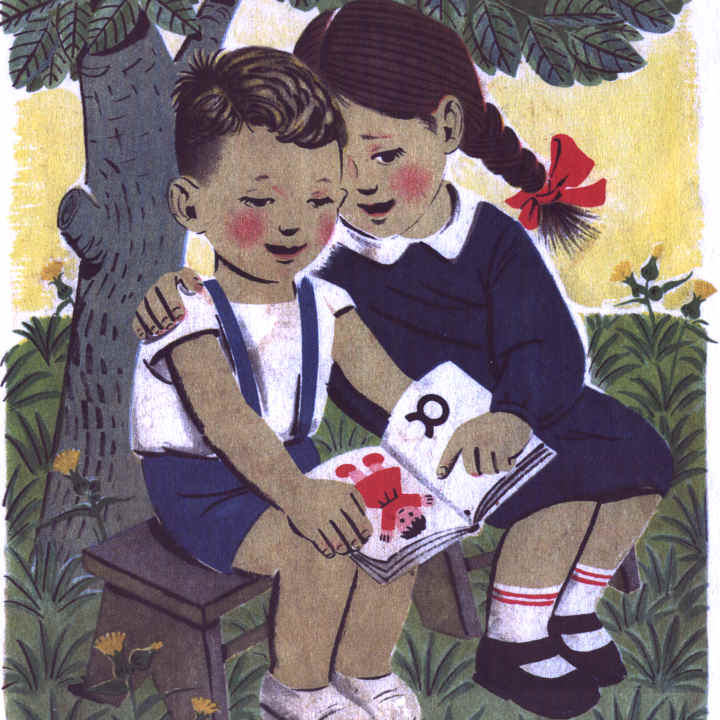 (Excerpt) At that moment the father came in. He saw what Lela was doing crouched and being angry he shouted: -You careless, you broke the flower vase, and on top you don’t say anything! You shall stay home therefore, so that the other time you’ll learn to be more careful. Lela lowered her eyes and didn’t say anything. Little Costas bewildered looked for a moment at Lele, then at his father and said: - Not Lela, father! I shall stay at home, because I broke the flower vase. The father stood for a moment and looked at his children with emotion. Then he hugged both of them and he said: -You will come both with me, because both of you are good children. You, Lela, because without complaint you accepted to be punished for the sake of your brother. And you, little Costas, because you didn’t consent in hiding your error. Come and give me a kiss and let us go.(Extracto) En ese momento entró el padre. Vio lo que Lela estaba haciendo agachada y estando enojado gritó: -¡Descuidada, rompiste el florero, y por encima no dices nada! Te quedarás en casa, por lo tanto, para que aprendas la otra vez a ser más cuidada. Lela bajó los ojos y no dijo nada. El pequeño Costas desconcertado miró por un momento a Lela, luego a su padre y dijo: - ¡Lela no, padre! Me quedaré yo en casa, porque yo rompí el florero. El padre se paró por un momento y miró a sus hijos con emoción. Luego los abrazó ambos y dijo: -Vendréis los dos conmigo, porque ambos sois buenos niños. Tu, Lela, porque sin queja aceptaste ser castigada por el bien de tu hermano. Y tu, pequeño Costas, porque no consentiste en ocultar tu error. Venid a darme un beso y vamonos.
(Excerpt) At that moment the father came in. He saw what Lela was doing crouched and being angry he shouted: -You careless, you broke the flower vase, and on top you don’t say anything! You shall stay home therefore, so that the other time you’ll learn to be more careful. Lela lowered her eyes and didn’t say anything. Little Costas bewildered looked for a moment at Lele, then at his father and said: - Not Lela, father! I shall stay at home, because I broke the flower vase. The father stood for a moment and looked at his children with emotion. Then he hugged both of them and he said: -You will come both with me, because both of you are good children. You, Lela, because without complaint you accepted to be punished for the sake of your brother. And you, little Costas, because you didn’t consent in hiding your error. Come and give me a kiss and let us go.(Extracto) En ese momento entró el padre. Vio lo que Lela estaba haciendo agachada y estando enojado gritó: -¡Descuidada, rompiste el florero, y por encima no dices nada! Te quedarás en casa, por lo tanto, para que aprendas la otra vez a ser más cuidada. Lela bajó los ojos y no dijo nada. El pequeño Costas desconcertado miró por un momento a Lela, luego a su padre y dijo: - ¡Lela no, padre! Me quedaré yo en casa, porque yo rompí el florero. El padre se paró por un momento y miró a sus hijos con emoción. Luego los abrazó ambos y dijo: -Vendréis los dos conmigo, porque ambos sois buenos niños. Tu, Lela, porque sin queja aceptaste ser castigada por el bien de tu hermano. Y tu, pequeño Costas, porque no consentiste en ocultar tu error. Venid a darme un beso y vamonos.Download MP3
Audio duration 4min - 479 Greek wordsDuración del audio 4min - 479 palabras griegas
 (Excerpt) Marica has a hidden complaint. Marica loves her little cousins and her classmates with all her heart. They however do not love her. Marica understands that, because during their games they do not play with her. But how can they love her? Marica, while she is so good, she also has one very big defect. She is always dirty. Every morning, while all the people are washing, Marica does not want to wash herself. She is afraid of the water, as if it is fire. While all the children every day are combing their hair, Marica does not want to comb her hair. As if she is afraid that the comb is going to eat her with its teeth! If she weren’t there her mother, in order to wash her and to clean her up, Marica would go out from her house, without drenching not even her fingers in the water. But all the efforts of her mother are in vain. As soon as Marica stays on her own, not even an hour passes and she is again dirty.(Extracto) Marica tiene una queja oculta. Marica quiere a sus primitos y sus compañeras de clase con todo su corazón. Ellas sin embargo no la quieren. Marica lo entiende, porque en sus juegos no juegan con ella. ¿Pero como pueden quererla? Marica, mientras ella es tan buena, también tiene un defecto muy grande. Ella está siempre sucia. Todas las mañanas, mientras toda la gente se están lavando, Marica no quiere lavarse. Tiene miedo al agua, como si fuera fuego. Mientras que todos los niños todos los dias se estan peinando, Marica no quiere peinarse. ¡Como si tuviera miedo que la peine la va a comer con sus dientes! Si no estuviera allí su madre, para lavarla y para arreglarla, Marica saldría de su casa, sin mojar ni siquiera sus dedos en el agua. Pero todos los esfuerzos de su madre son en vano. Tan pronto como Marica se queda sola, no pasa ni una hora y es otra vez sucia.
(Excerpt) Marica has a hidden complaint. Marica loves her little cousins and her classmates with all her heart. They however do not love her. Marica understands that, because during their games they do not play with her. But how can they love her? Marica, while she is so good, she also has one very big defect. She is always dirty. Every morning, while all the people are washing, Marica does not want to wash herself. She is afraid of the water, as if it is fire. While all the children every day are combing their hair, Marica does not want to comb her hair. As if she is afraid that the comb is going to eat her with its teeth! If she weren’t there her mother, in order to wash her and to clean her up, Marica would go out from her house, without drenching not even her fingers in the water. But all the efforts of her mother are in vain. As soon as Marica stays on her own, not even an hour passes and she is again dirty.(Extracto) Marica tiene una queja oculta. Marica quiere a sus primitos y sus compañeras de clase con todo su corazón. Ellas sin embargo no la quieren. Marica lo entiende, porque en sus juegos no juegan con ella. ¿Pero como pueden quererla? Marica, mientras ella es tan buena, también tiene un defecto muy grande. Ella está siempre sucia. Todas las mañanas, mientras toda la gente se están lavando, Marica no quiere lavarse. Tiene miedo al agua, como si fuera fuego. Mientras que todos los niños todos los dias se estan peinando, Marica no quiere peinarse. ¡Como si tuviera miedo que la peine la va a comer con sus dientes! Si no estuviera allí su madre, para lavarla y para arreglarla, Marica saldría de su casa, sin mojar ni siquiera sus dedos en el agua. Pero todos los esfuerzos de su madre son en vano. Tan pronto como Marica se queda sola, no pasa ni una hora y es otra vez sucia.Download MP3
Audio duration 2min - 254 Greek wordsDuración del audio 2min - 254 palabras griegas
 (Excerpt) Inside the classroom of little Costas, on a nice little table, there are placed a few flower vases. The children are always taking care on turns to decorate them with flowers of the season: violets, lilies, roses, daisies, carnations and others, that make the classroom cheerful and jovial. They say that the flowers, wherever they are, either in the gardens, or in the valleys, or in the forests, they have the habit to secretly talk with the air and with the butterflies. This is what they were whispering at one time the flowers in the ears of the children slowly slowly, in a way that nobody else could hear it.(Extracto) Dentro del aula del pequeño Costas, en una linda mesita, están colocados unos cuantos floreros. Los niños están siempre cuidando en turnos a decorarlos con flores de la época: violetas, lirios, rosas, margaritas, claveles y otros, que hacen el aula alegre y jovial. Dicen que las flores, donde quiera que estén, ya sea en los jardines, o en los valles, o en los bosques, tienen el hábito a hablar en secreto con el aire y con las mariposas. Esto es lo que estaban susurrando en un tiempo las flores en los oídos de los niños lentamente lentamente, de una manera que nadie más podría escucharlo.
(Excerpt) Inside the classroom of little Costas, on a nice little table, there are placed a few flower vases. The children are always taking care on turns to decorate them with flowers of the season: violets, lilies, roses, daisies, carnations and others, that make the classroom cheerful and jovial. They say that the flowers, wherever they are, either in the gardens, or in the valleys, or in the forests, they have the habit to secretly talk with the air and with the butterflies. This is what they were whispering at one time the flowers in the ears of the children slowly slowly, in a way that nobody else could hear it.(Extracto) Dentro del aula del pequeño Costas, en una linda mesita, están colocados unos cuantos floreros. Los niños están siempre cuidando en turnos a decorarlos con flores de la época: violetas, lirios, rosas, margaritas, claveles y otros, que hacen el aula alegre y jovial. Dicen que las flores, donde quiera que estén, ya sea en los jardines, o en los valles, o en los bosques, tienen el hábito a hablar en secreto con el aire y con las mariposas. Esto es lo que estaban susurrando en un tiempo las flores en los oídos de los niños lentamente lentamente, de una manera que nadie más podría escucharlo.Download MP3
Audio duration 8min - 874 Greek wordsDuración del audio 8min - 874 palabras griegas
 (Excerpt) When they had advanced towards the house, the mother saw, that little Helen was not eating pastry. -Didn’t you buy pastry, little Helen? -I am not hungry mom. -Strange! Said she and she looked at her with some concern. In a while they arrived at home. The moment that they were entering inside, their mother shouted scared: -Where is little Helen? The children went outside again, in order to see what was going on. Down there at the edge of the street, they saw her standing and talking with a little child. -She is talking with a beggar child, said Yiannis to his mother. Last Sunday also this child was standing on the same spot. He is wearing some clothes that are very used. -This is not a reason, my child, for not speaking to him, said the mother. And I understand very well what is going on. Your sister did not buy a pastry in order to give her money to this poor boy.(Extracto) Cuando habían avanzado hacia la casa, la madre vio, que la pequeña Helena no estaba comiendo pastel. -¿No compraste pastelito, pequeña Helena? -No tengo hambre mamá. -¡Extraño! Dijo ella y la miró con algo de preocupación. En un rato llegaron a casa. En el momento en que estaban entrando, su madre gritó asustada: -¿Dónde está la pequeña Helena? Los niños salieron fuera otra vez, para ver que estaba pasando. Ahí abajo a la orilla de la calle, la vieron estando de pie y hablando con un niño pequeño. -Está hablando con un niño mendigo, dijo Yiannis a su madre. El domingo pasado también este niño estaba en el mismo lugar. Está llevando una ropa muy usada. -Esta no es una razón, hijo mio, por no hablar con él, dijo la madre. Y entiendo muy bien que esta pasando. Vuestra hermana no compró un pastel para dar su dinero a este pobre niño.
(Excerpt) When they had advanced towards the house, the mother saw, that little Helen was not eating pastry. -Didn’t you buy pastry, little Helen? -I am not hungry mom. -Strange! Said she and she looked at her with some concern. In a while they arrived at home. The moment that they were entering inside, their mother shouted scared: -Where is little Helen? The children went outside again, in order to see what was going on. Down there at the edge of the street, they saw her standing and talking with a little child. -She is talking with a beggar child, said Yiannis to his mother. Last Sunday also this child was standing on the same spot. He is wearing some clothes that are very used. -This is not a reason, my child, for not speaking to him, said the mother. And I understand very well what is going on. Your sister did not buy a pastry in order to give her money to this poor boy.(Extracto) Cuando habían avanzado hacia la casa, la madre vio, que la pequeña Helena no estaba comiendo pastel. -¿No compraste pastelito, pequeña Helena? -No tengo hambre mamá. -¡Extraño! Dijo ella y la miró con algo de preocupación. En un rato llegaron a casa. En el momento en que estaban entrando, su madre gritó asustada: -¿Dónde está la pequeña Helena? Los niños salieron fuera otra vez, para ver que estaba pasando. Ahí abajo a la orilla de la calle, la vieron estando de pie y hablando con un niño pequeño. -Está hablando con un niño mendigo, dijo Yiannis a su madre. El domingo pasado también este niño estaba en el mismo lugar. Está llevando una ropa muy usada. -Esta no es una razón, hijo mio, por no hablar con él, dijo la madre. Y entiendo muy bien que esta pasando. Vuestra hermana no compró un pastel para dar su dinero a este pobre niño.Download MP3
Audio duration 4min - 406 Greek wordsDuración del audio 4min - 406 palabras griegas
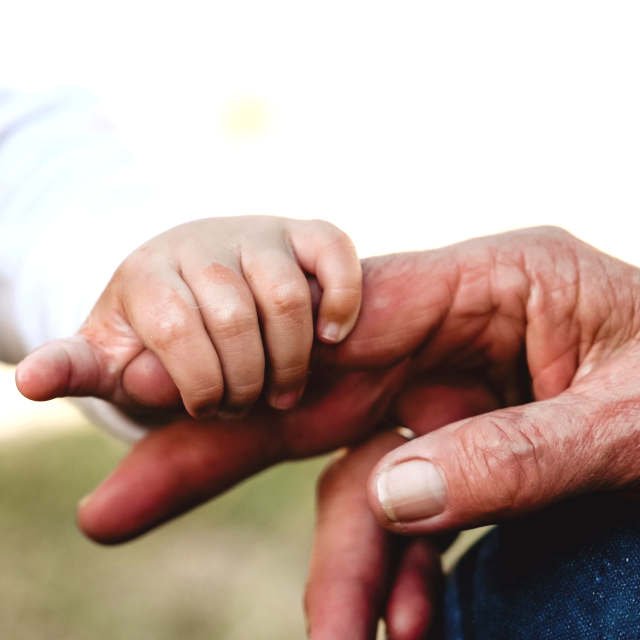 (Excerpt) Your five little fingers live in a little house, that is called hand. At this moment, that you are seeing the hand in the picture, the fingers are having a council. -I am hungry, says the Thumb finger. -I am hungry too, but I don’t have anything to eat! says the Index finger. -What are we going to do? asks the Middle finger. - I don’t know... whispers the Ring finger, scratching his head. -Let’s get to work! the Little finger shouts. Whoever works, eats! Whoever doesn’t work, doesn’t eat! Therefore, if you want us to eat, we must get to work. The five brothers listened to the advice of the small one and since then they started to work. In their work they are accompanying them also the other five little brothers, who are sitting on the other hand.(Extracto) Vuestros cinco deditos viven en una casita, que se llama mano. En este momento, que estáis viendo la mano en la imagen, los dedos están teniendo un consejo. -Tengo hambre, dice el dedo Pulgar. - Yo también tengo hambre, ¡pero no tengo nada para comer! dice el dedo Índice. -¿Qué vamos a hacer? dedo el dedo Medio. - No sé... susurra el dedo Anular, rascándose su cabeza. - ¡Vamos a trabajar! el dedo Meñique grita. ¡El que trabaja, come! ¡El que no trabaja, no come! Por lo tanto, si queréis que nos comemos, debemos ponernos a trabajar. Los cinco hermanos escucharon a los consejos del pequeño y desde entonces empezaron a trabajar. En su trabajo los estan acompañando también los otros cinco hermanitos, que se encuentran en la otra mano.
(Excerpt) Your five little fingers live in a little house, that is called hand. At this moment, that you are seeing the hand in the picture, the fingers are having a council. -I am hungry, says the Thumb finger. -I am hungry too, but I don’t have anything to eat! says the Index finger. -What are we going to do? asks the Middle finger. - I don’t know... whispers the Ring finger, scratching his head. -Let’s get to work! the Little finger shouts. Whoever works, eats! Whoever doesn’t work, doesn’t eat! Therefore, if you want us to eat, we must get to work. The five brothers listened to the advice of the small one and since then they started to work. In their work they are accompanying them also the other five little brothers, who are sitting on the other hand.(Extracto) Vuestros cinco deditos viven en una casita, que se llama mano. En este momento, que estáis viendo la mano en la imagen, los dedos están teniendo un consejo. -Tengo hambre, dice el dedo Pulgar. - Yo también tengo hambre, ¡pero no tengo nada para comer! dice el dedo Índice. -¿Qué vamos a hacer? dedo el dedo Medio. - No sé... susurra el dedo Anular, rascándose su cabeza. - ¡Vamos a trabajar! el dedo Meñique grita. ¡El que trabaja, come! ¡El que no trabaja, no come! Por lo tanto, si queréis que nos comemos, debemos ponernos a trabajar. Los cinco hermanos escucharon a los consejos del pequeño y desde entonces empezaron a trabajar. En su trabajo los estan acompañando también los otros cinco hermanitos, que se encuentran en la otra mano.Download MP3
Audio duration 5min - 600 Greek wordsDuración del audio 5min - 600 palabras griegas
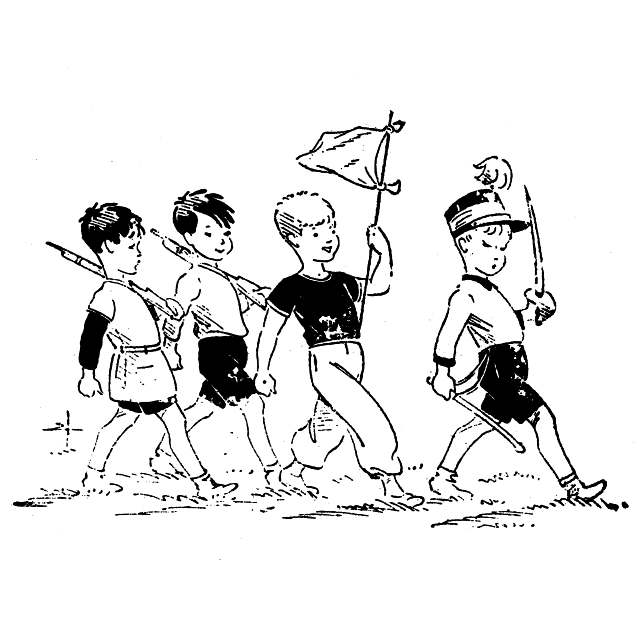 (Excerpt) Little Dimitris full of joy showed to his friends the military cap and he said: -Behold what my father have given to me for the day of my Saint! Doesn’t it really look like a military one? -How beautiful it is! little Costas shouted. It is exactly like those that the officers are wearing! -Do you know what we could do? Pericles said, whose little head was always generating ideas for game playing. Let’s do as if we are an army. And you, Dimitris, you will be our captain, since it is your name day today and you also have the golden military cap. -And I will carry the flag! George shouted, who wanted himself too to have the supremacy. -Here it is, take it already! Little Dimitris said. He put in his hand a small pole and he tied his handkerchief on the other edge. Himself he put on the military cap, and it suited him perfectly. -Attention! Forward... march! One, two, one, two! Quick march! And they started marching within the alleyways of the garden.(Extracto) El pequeño Dimitris lleno de alegría mostró a sus amigos el casquillo militar y dijo: -¡Mirad que me ha regalado mi padre para el día de mi Santo! ¿No parece realmente como militar? -¡Que bueno es! gritó el pequeño Costas. Es igual como los que llevan los oficiales! -¿Sabéis lo que podríamos hacer? dijo Pericles, cuya cabecita siempre bajaba ideas para juegos. Hagamos como si somos un ejército. Y tú, Dimitris, serás nuestro capitán, ya que es tu día de santo hoy y también tienes la gorra militar dorada. -¡Y yo llevaré la bandera! Jorge gritó, que también quería tener la supremacía. -Aquí está, ¡tómala ya! Dijo el pequeño Dimitris. Puso en su mano un pequeño palo y le ató su pañuelo en el otro lado. Él mismo se puso la gorra militar, y le quedaba perfecto. -¡Atención! Adelante… ¡marcha! ¡Uno, dos, uno, dos! ¡Marcha rápida! Y comenzaron a marchar dentro de los callejones del jardín.
(Excerpt) Little Dimitris full of joy showed to his friends the military cap and he said: -Behold what my father have given to me for the day of my Saint! Doesn’t it really look like a military one? -How beautiful it is! little Costas shouted. It is exactly like those that the officers are wearing! -Do you know what we could do? Pericles said, whose little head was always generating ideas for game playing. Let’s do as if we are an army. And you, Dimitris, you will be our captain, since it is your name day today and you also have the golden military cap. -And I will carry the flag! George shouted, who wanted himself too to have the supremacy. -Here it is, take it already! Little Dimitris said. He put in his hand a small pole and he tied his handkerchief on the other edge. Himself he put on the military cap, and it suited him perfectly. -Attention! Forward... march! One, two, one, two! Quick march! And they started marching within the alleyways of the garden.(Extracto) El pequeño Dimitris lleno de alegría mostró a sus amigos el casquillo militar y dijo: -¡Mirad que me ha regalado mi padre para el día de mi Santo! ¿No parece realmente como militar? -¡Que bueno es! gritó el pequeño Costas. Es igual como los que llevan los oficiales! -¿Sabéis lo que podríamos hacer? dijo Pericles, cuya cabecita siempre bajaba ideas para juegos. Hagamos como si somos un ejército. Y tú, Dimitris, serás nuestro capitán, ya que es tu día de santo hoy y también tienes la gorra militar dorada. -¡Y yo llevaré la bandera! Jorge gritó, que también quería tener la supremacía. -Aquí está, ¡tómala ya! Dijo el pequeño Dimitris. Puso en su mano un pequeño palo y le ató su pañuelo en el otro lado. Él mismo se puso la gorra militar, y le quedaba perfecto. -¡Atención! Adelante… ¡marcha! ¡Uno, dos, uno, dos! ¡Marcha rápida! Y comenzaron a marchar dentro de los callejones del jardín.Download MP3
Audio duration 3min - 309 Greek wordsDuración del audio 3min - 309 palabras griegas
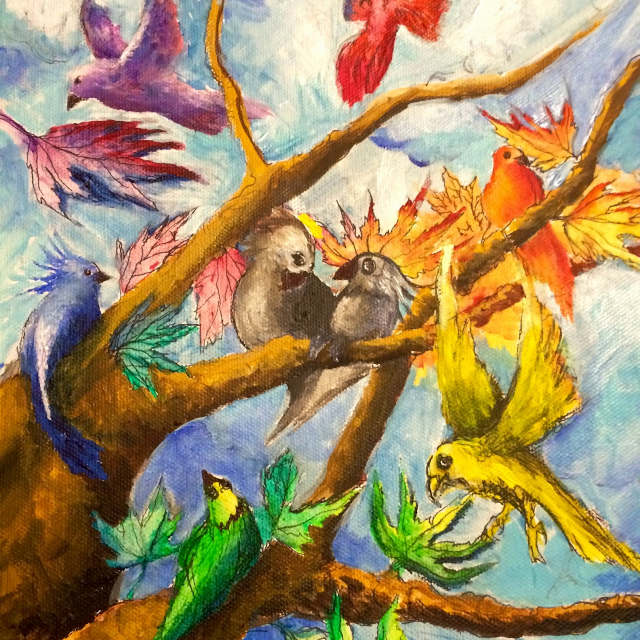 (Excerpt) -Also the birds are going to school every morning! The teacher was saying one day in the classroom of Phroso. But that school has neither walls, like ours, nor roof. Its roof is the sky and its floor the branches of a great oak tree on the prairie. Their teacher is mister Blackbird, with the beautiful black dress of his and with his melodic voice. As soon as he whistles, all his winged students gather around him and the lesson begins. Each student says his lesson singing! And each one explains in his own way, how he finds the seeds and how he catches the insects and the worms.(Extracto) -¡También los pájaros van a la escuela cada mañana! El profesor estaba diciendo un dia en el aula de Froso. Pero esa escuela no tiene ni paredes, como el nuestro, ni techo. Su techo es el cielo y su suelo las ramas de un gran árbol de roble en la pradera. Su maestro es el señor Mirlo, con el hermoso vestido negro suyo y con su melódica voz. Tan pronto como silba, todos sus alumnos alados se reúnen a su alrededor y la lección comienza. ¡Cada estudiante dice su lección cantando! Y cada uno explica a su propia manera, como encuentra las semillas y como coge los insectos y los gusanos.
(Excerpt) -Also the birds are going to school every morning! The teacher was saying one day in the classroom of Phroso. But that school has neither walls, like ours, nor roof. Its roof is the sky and its floor the branches of a great oak tree on the prairie. Their teacher is mister Blackbird, with the beautiful black dress of his and with his melodic voice. As soon as he whistles, all his winged students gather around him and the lesson begins. Each student says his lesson singing! And each one explains in his own way, how he finds the seeds and how he catches the insects and the worms.(Extracto) -¡También los pájaros van a la escuela cada mañana! El profesor estaba diciendo un dia en el aula de Froso. Pero esa escuela no tiene ni paredes, como el nuestro, ni techo. Su techo es el cielo y su suelo las ramas de un gran árbol de roble en la pradera. Su maestro es el señor Mirlo, con el hermoso vestido negro suyo y con su melódica voz. Tan pronto como silba, todos sus alumnos alados se reúnen a su alrededor y la lección comienza. ¡Cada estudiante dice su lección cantando! Y cada uno explica a su propia manera, como encuentra las semillas y como coge los insectos y los gusanos.Download MP3
Audio duration 4min - 437 Greek wordsDuración del audio 4min - 437 palabras griegas
 (Excerpt) The autumn brought with it the blessed rain and the cool weather. The sky now is not like in the summer always blue. Black clouds are often covering it and the birds are not signing any more on the trees. The trails of the forest are covered with dried leaves and the naked branches seem as if they are cold. Thanasis and little Eugenia, two small children from the village, they are climbing the slope and they are entering into the forest. Their mother is sending them in order to collect dry leafs, for Moschoula, their little goat in order to sleep on them and not being cold. Many children are coming to the forest and they pretend to be working like the adults, only in order to play. But these two children have not come in order to play. Thanasis is pulling the little cart and little Eugenia is carrying a big sack in her back.(Extracto) El otoño trajo consigo la lluvia bendita y el clima fresco. El cielo ahora no es como en el verano siempre azul. Nubes negras a menudo lo están cubriendo y los pájaros ya no estan cantando en los árboles. Los senderos del bosque están cubiertos con hojas secas y las ramas desnudas parecen como si tengan frío. Thanasis y la pequeña Eugenia, dos niños pequeños del pueblo, estan subiendo la cuesta y estan entrando en el bosque. Su madre les está enviando para recoger hojas secas, para Mosjula, su cabrita para dormir sobre ellas y no pasar frío. Muchos niños vienen al bosque y pretenden estar trabajando como los adultos, solo para jugar. Pero estos dos niños no han venido para jugar. Thanasis esta tirando del carrito y la pequeña Eugenia lleva un saco grande a su espalda.
(Excerpt) The autumn brought with it the blessed rain and the cool weather. The sky now is not like in the summer always blue. Black clouds are often covering it and the birds are not signing any more on the trees. The trails of the forest are covered with dried leaves and the naked branches seem as if they are cold. Thanasis and little Eugenia, two small children from the village, they are climbing the slope and they are entering into the forest. Their mother is sending them in order to collect dry leafs, for Moschoula, their little goat in order to sleep on them and not being cold. Many children are coming to the forest and they pretend to be working like the adults, only in order to play. But these two children have not come in order to play. Thanasis is pulling the little cart and little Eugenia is carrying a big sack in her back.(Extracto) El otoño trajo consigo la lluvia bendita y el clima fresco. El cielo ahora no es como en el verano siempre azul. Nubes negras a menudo lo están cubriendo y los pájaros ya no estan cantando en los árboles. Los senderos del bosque están cubiertos con hojas secas y las ramas desnudas parecen como si tengan frío. Thanasis y la pequeña Eugenia, dos niños pequeños del pueblo, estan subiendo la cuesta y estan entrando en el bosque. Su madre les está enviando para recoger hojas secas, para Mosjula, su cabrita para dormir sobre ellas y no pasar frío. Muchos niños vienen al bosque y pretenden estar trabajando como los adultos, solo para jugar. Pero estos dos niños no han venido para jugar. Thanasis esta tirando del carrito y la pequeña Eugenia lleva un saco grande a su espalda.Download MP3
Audio duration 3min - 362 Greek wordsDuración del audio 3min - 362 palabras griegas
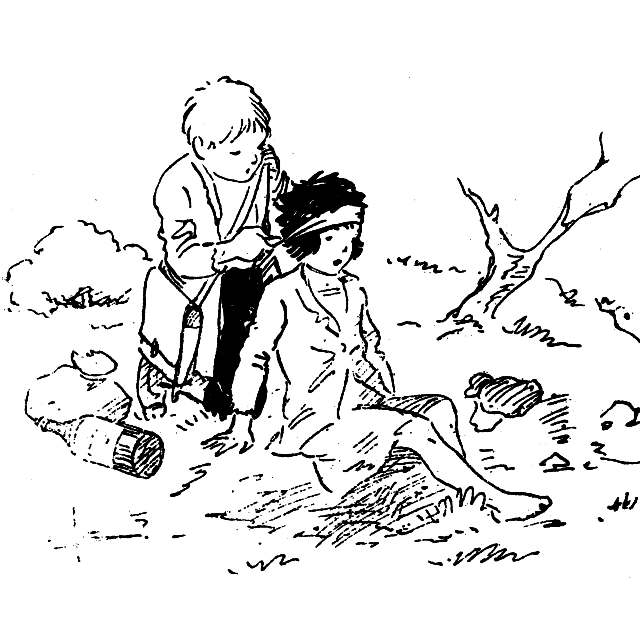 (Excerpt) It was the end of the autumn and when he reached to the forest, thick fog had fallen. Photes could hardly discern the pathway. Luckily he had passed from there so many times, otherwise he could take some other route. Thus as he was walking, it seemed to him that he heard shouting and groaning on his right side inside a field. He stopped in order to look, but inside such a thick fog he could not discern anything. Then he got scared and he started running with all his might, but a brave thought made him stop again: -There is someone, he said to himself, who is suffering and is asking for help. Maybe I can help him. I must look to see where he is. This thought brought back all the courage to little Photes. The groaning continued. He turned back and he walked towards the place, from which he had fled.(Extracto) Era el final del otoño y cuando llegó al bosque, había caído una espesa niebla. Fotes apenas podría discernir el camino. Por suerte el había pasado de allí tantas veces, si no podría tomar alguna otra ruta. Así mientras caminaba, le pareció que oyó gritos y gemidos dentro de un campo a su lado derecho. Se detuvo para mirar, pero dentro de niebla tan espesa no podría discernir nada. Entonces se asustó y empezó a correr con todas sus fuerzas, pero un pensamiento valiente le hizo parar de nuevo: -Hay alguien, se dijo a si mismo, quien esta sufriendo y está pidiendo ayuda. Tal vez pueda ayudarle. Debo mirar para ver dónde está. Este pensamiento restauró todo el coraje al pequeño Fotes. Los gemidos continuaban. Volvió atrás y caminó hacia el lugar, de donde había huido.
(Excerpt) It was the end of the autumn and when he reached to the forest, thick fog had fallen. Photes could hardly discern the pathway. Luckily he had passed from there so many times, otherwise he could take some other route. Thus as he was walking, it seemed to him that he heard shouting and groaning on his right side inside a field. He stopped in order to look, but inside such a thick fog he could not discern anything. Then he got scared and he started running with all his might, but a brave thought made him stop again: -There is someone, he said to himself, who is suffering and is asking for help. Maybe I can help him. I must look to see where he is. This thought brought back all the courage to little Photes. The groaning continued. He turned back and he walked towards the place, from which he had fled.(Extracto) Era el final del otoño y cuando llegó al bosque, había caído una espesa niebla. Fotes apenas podría discernir el camino. Por suerte el había pasado de allí tantas veces, si no podría tomar alguna otra ruta. Así mientras caminaba, le pareció que oyó gritos y gemidos dentro de un campo a su lado derecho. Se detuvo para mirar, pero dentro de niebla tan espesa no podría discernir nada. Entonces se asustó y empezó a correr con todas sus fuerzas, pero un pensamiento valiente le hizo parar de nuevo: -Hay alguien, se dijo a si mismo, quien esta sufriendo y está pidiendo ayuda. Tal vez pueda ayudarle. Debo mirar para ver dónde está. Este pensamiento restauró todo el coraje al pequeño Fotes. Los gemidos continuaban. Volvió atrás y caminó hacia el lugar, de donde había huido.Download MP3
Audio duration 5min - 592 Greek wordsDuración del audio 5min - 592 palabras griegas
 (Excerpt) The grandfather of little Dimitris was a sailor. Now he was old and he was not traveling anymore. Very often however he was remembering the travels, that he was doing when he was young and he was narrating them to his grandson. And little Dimitris could not want anything more. When the grandfather was saying the strange stories of his journeys, little Dimitris was thinking, that it is very good for someone to be sailor. You are always traveling and you see so many places. One day, little Dimitris managed to convince his grandfather, to fabricate for him a nice little wooden boat. -And do you think, grandfather, that it will sail well my boat? little Dimitris was asking. - It will sail perfectly well, if you set its sails well. No boat can sail well, if the captain is not doing his job well.(Extracto) El abuelo del pequeño Dimitris era marinero. Ahora estaba viejo y ya no viajaba. Muy a menudo sin embargo estaba recordando los viajes, que estaba haciendo cuando era joven y los estaba contando a su nieto. Y el pequeño Dimitris no podría querer nada más. Cuando el abuelo contaba las extrañas historias de sus viajes, el pequeño Dimitris estaba pensando, que es muy bueno que alguien sea marinero. Siempre estás viajando y ves tantos lugares. Un día, el pequeño Dimitris logró convencer a su abuelo, a fabricar para el un bonito botecito de madera. -¿Y tú crees, abuelo, que va a navegar bien mi barco? el pequeño Dimitris estaba preguntando. - Navegará perfectamente bien, si pones las velas bien. Ningún barco puede navegar bien, si el capitán no está haciendo bien su trabajo.
(Excerpt) The grandfather of little Dimitris was a sailor. Now he was old and he was not traveling anymore. Very often however he was remembering the travels, that he was doing when he was young and he was narrating them to his grandson. And little Dimitris could not want anything more. When the grandfather was saying the strange stories of his journeys, little Dimitris was thinking, that it is very good for someone to be sailor. You are always traveling and you see so many places. One day, little Dimitris managed to convince his grandfather, to fabricate for him a nice little wooden boat. -And do you think, grandfather, that it will sail well my boat? little Dimitris was asking. - It will sail perfectly well, if you set its sails well. No boat can sail well, if the captain is not doing his job well.(Extracto) El abuelo del pequeño Dimitris era marinero. Ahora estaba viejo y ya no viajaba. Muy a menudo sin embargo estaba recordando los viajes, que estaba haciendo cuando era joven y los estaba contando a su nieto. Y el pequeño Dimitris no podría querer nada más. Cuando el abuelo contaba las extrañas historias de sus viajes, el pequeño Dimitris estaba pensando, que es muy bueno que alguien sea marinero. Siempre estás viajando y ves tantos lugares. Un día, el pequeño Dimitris logró convencer a su abuelo, a fabricar para el un bonito botecito de madera. -¿Y tú crees, abuelo, que va a navegar bien mi barco? el pequeño Dimitris estaba preguntando. - Navegará perfectamente bien, si pones las velas bien. Ningún barco puede navegar bien, si el capitán no está haciendo bien su trabajo.Download MP3
Audio duration 29min - 3558 Greek wordsDuración del audio 29min - 3558 palabras griegas
 (Excerpt) The Holy Bible became a valuable friend of the sick boy. He was reading it and he was reading it again. In the beginning he didn’t understand many things. But he didn’t let it from his hands. He insisted reading. Little by little, week after week, month after month, he began to understand it all the better. And the more he understood it, more and more he desired reading it. He had thirst to learn about Christ.(Extracto) La Biblia Sagrada se convirtió en un amigo valioso del niño enfermo. La estaba leyendo y la estaba leyendo de nuevo. En el principio no entendía muchas cosas. Pero no la dejaba de sus manos. Insistia en leer. Poco a poco, semana tras semana, mes tras mes, comenzó a entenderla todo lo mejor. Y cuanto más la entendía, más y más deseaba leyéndola. Tenía sed de aprender sobre Cristo.
(Excerpt) The Holy Bible became a valuable friend of the sick boy. He was reading it and he was reading it again. In the beginning he didn’t understand many things. But he didn’t let it from his hands. He insisted reading. Little by little, week after week, month after month, he began to understand it all the better. And the more he understood it, more and more he desired reading it. He had thirst to learn about Christ.(Extracto) La Biblia Sagrada se convirtió en un amigo valioso del niño enfermo. La estaba leyendo y la estaba leyendo de nuevo. En el principio no entendía muchas cosas. Pero no la dejaba de sus manos. Insistia en leer. Poco a poco, semana tras semana, mes tras mes, comenzó a entenderla todo lo mejor. Y cuanto más la entendía, más y más deseaba leyéndola. Tenía sed de aprender sobre Cristo.Download MP3
Audio duration 23min - 2463 Greek wordsDuración del audio 23min - 2463 palabras griegas
 (Excerpt) After they had eaten, each one took his lyre and they trained to the learning of music. Centaur was inspecting them all, he was correcting their mistakes and he was teaching them how to play the strings in order to make sounds more sweet. Afterwards they sat on thrones of stone that were dispersed under the shadow of the trees, and they were listening carefully to Centaur who was teaching. «The King», the wise Centaur was saying, «must sacrifice himself and all his possessions for his homeland. A good king must only have a single concern; how to make his people happy, and his kingdom strong and famed». In the evening they went to a plain that was totally green due to its vegetation; they took off their clothes and they trained in running, in wrestling, in jumping and in stone throwing.(Extracto) Después de que ellos comieron tomaron cada uno su lira y se entrenaron al aprendizaje de la música. Centauro los estaba inspeccionando a todos, estaba corrigiendo sus errores y les estaba enseñando como tocar las cuerdas para producir sonidos más dulces. Después se sentaron en tronos de piedra que estaban dispersos por debajo de la sombra de los árboles, y estaban escuchando cuidadosamente a Centauro que estaba enseñando. «El Rey», decía el sabio Centauro, «debe sacrificarse a sí mismo y todas sus posesiones por su patria. Una preocupación solo debe tener el buen rey; como hacer feliz a su pueblo, y su reino fuerte y famoso». Por la tarde fueron en una planicie totalmente verde por la vegetación; quitaron su ropa y se entrenaron en correr, en la lucha, en saltar y en el lanzamiento de piedra.
(Excerpt) After they had eaten, each one took his lyre and they trained to the learning of music. Centaur was inspecting them all, he was correcting their mistakes and he was teaching them how to play the strings in order to make sounds more sweet. Afterwards they sat on thrones of stone that were dispersed under the shadow of the trees, and they were listening carefully to Centaur who was teaching. «The King», the wise Centaur was saying, «must sacrifice himself and all his possessions for his homeland. A good king must only have a single concern; how to make his people happy, and his kingdom strong and famed». In the evening they went to a plain that was totally green due to its vegetation; they took off their clothes and they trained in running, in wrestling, in jumping and in stone throwing.(Extracto) Después de que ellos comieron tomaron cada uno su lira y se entrenaron al aprendizaje de la música. Centauro los estaba inspeccionando a todos, estaba corrigiendo sus errores y les estaba enseñando como tocar las cuerdas para producir sonidos más dulces. Después se sentaron en tronos de piedra que estaban dispersos por debajo de la sombra de los árboles, y estaban escuchando cuidadosamente a Centauro que estaba enseñando. «El Rey», decía el sabio Centauro, «debe sacrificarse a sí mismo y todas sus posesiones por su patria. Una preocupación solo debe tener el buen rey; como hacer feliz a su pueblo, y su reino fuerte y famoso». Por la tarde fueron en una planicie totalmente verde por la vegetación; quitaron su ropa y se entrenaron en correr, en la lucha, en saltar y en el lanzamiento de piedra.Download MP3

Γιὰ τὴν Σοφία καὶ τὸν Ἀλέξανδρο...
Copyright © 2020 Symeon Megalos - All Rights Reserved
+30.6972.6972.21 patrologos@gmail.com

